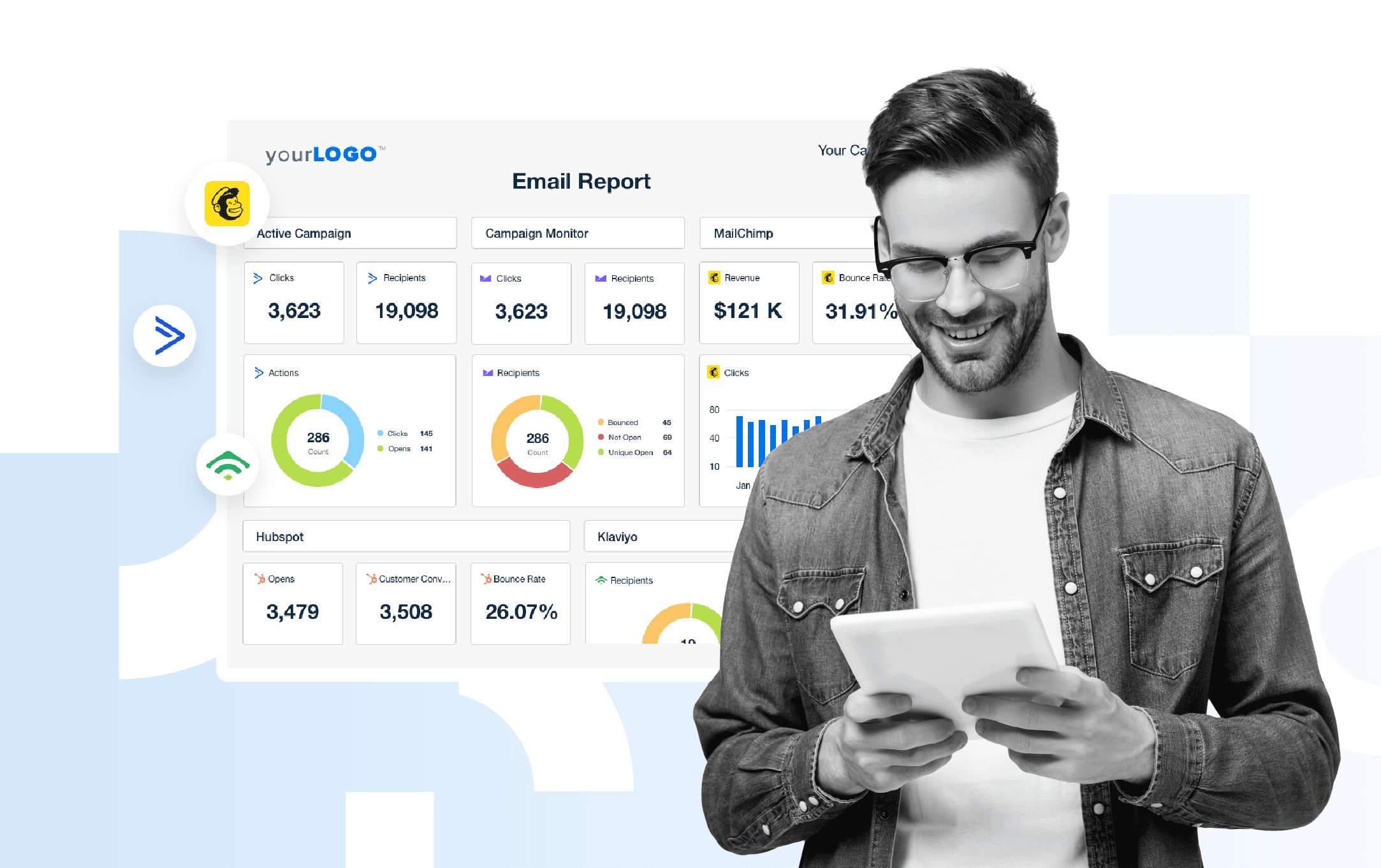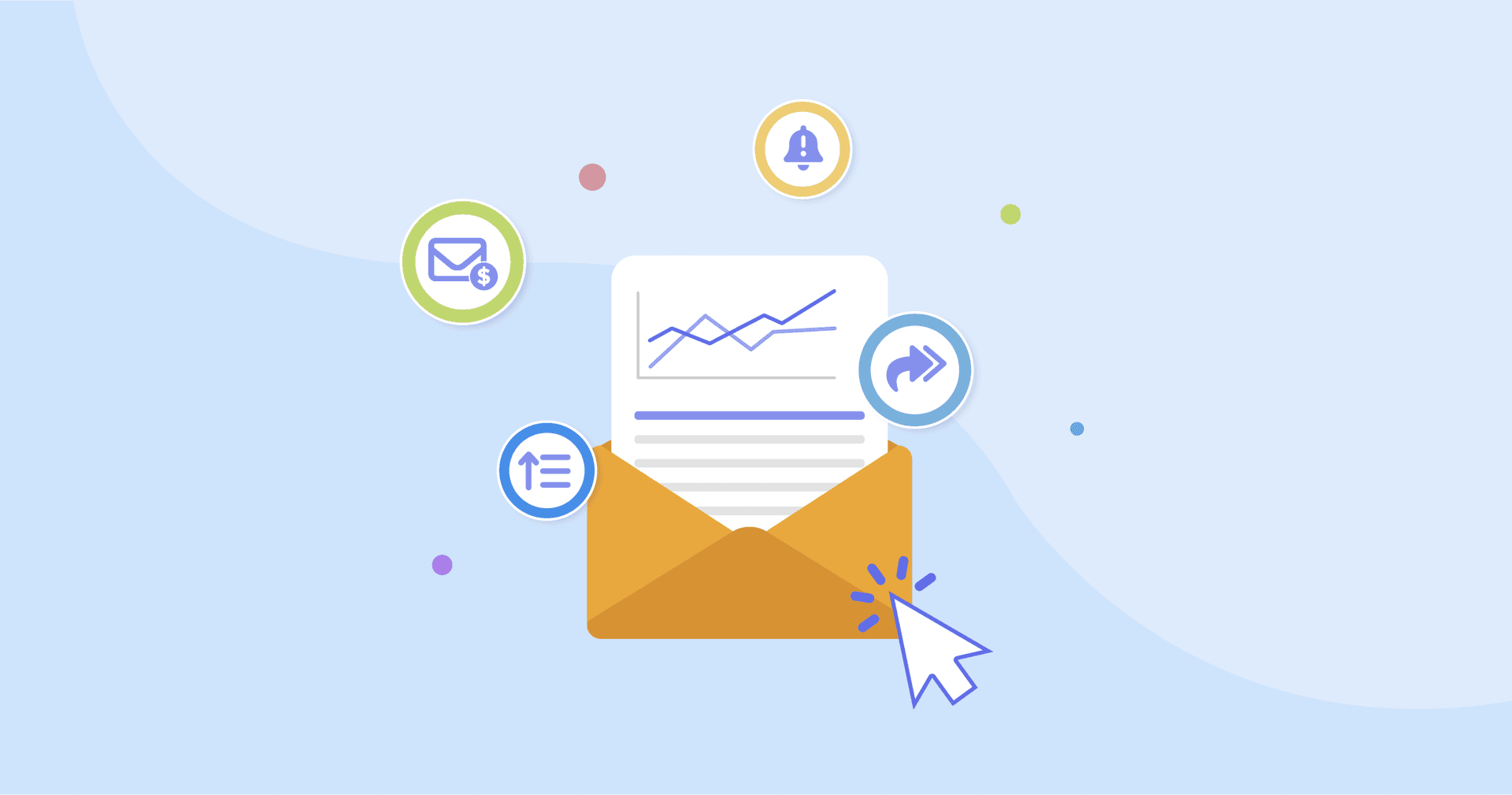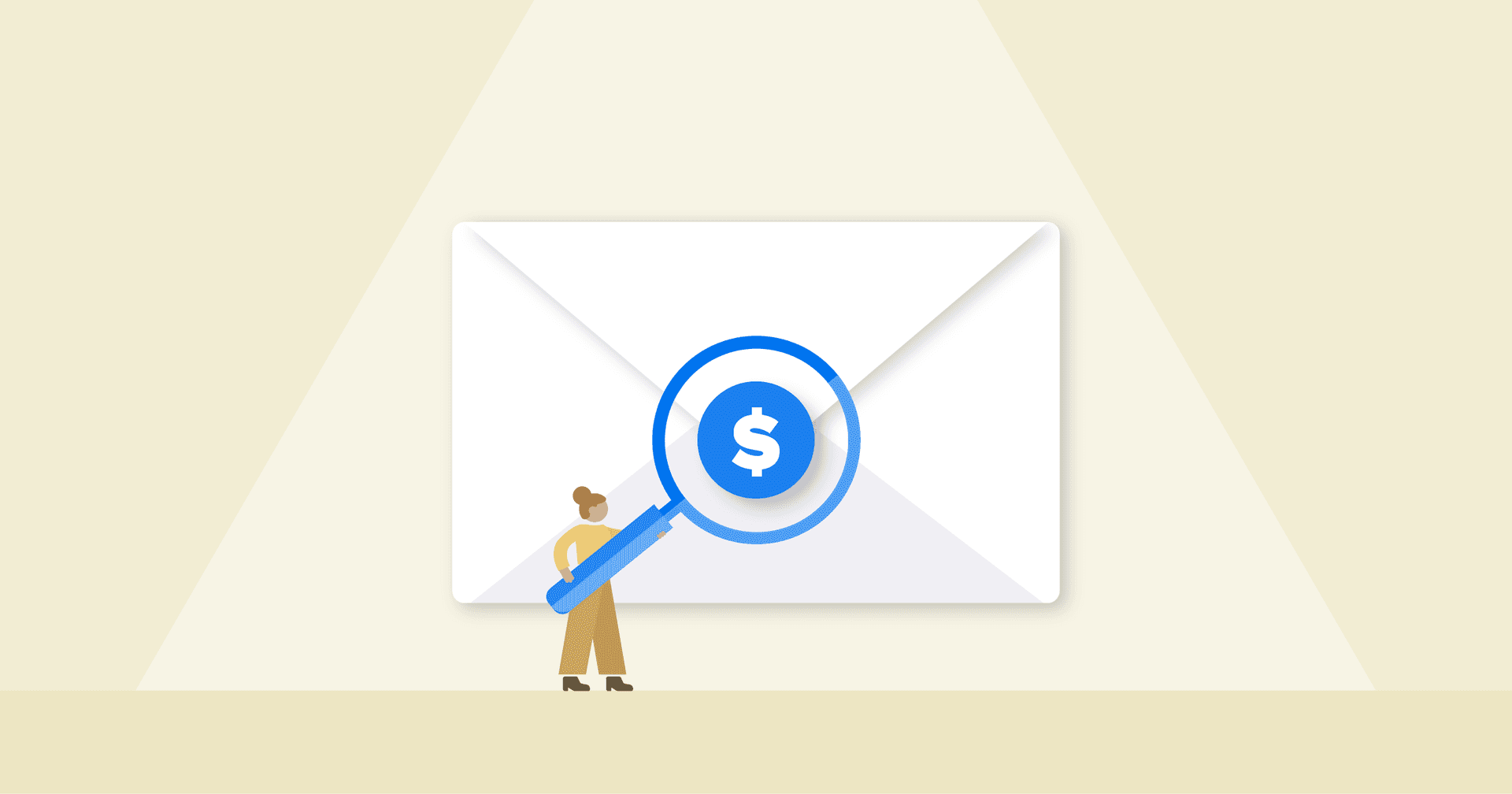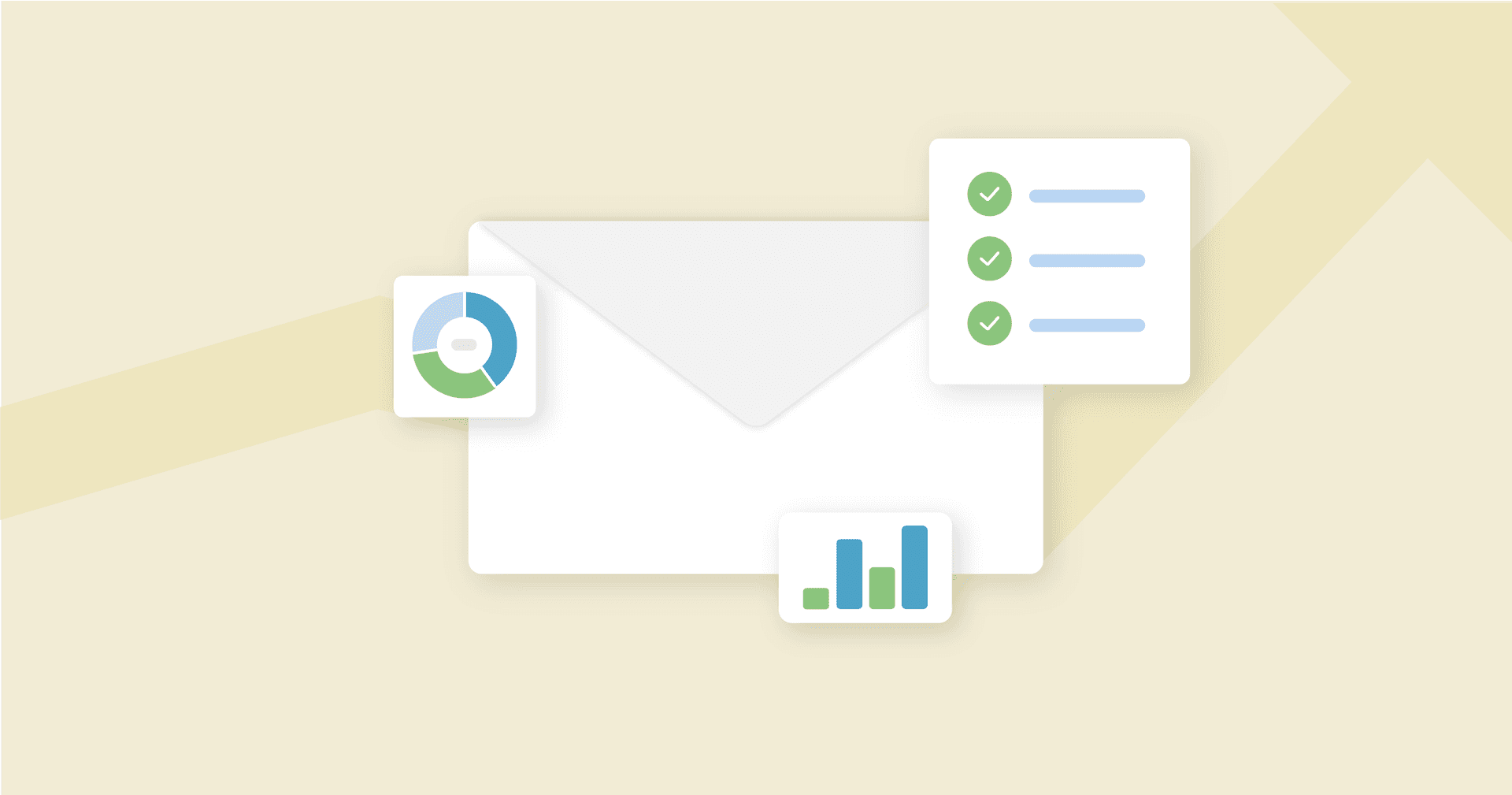Table of Contents
Table of Contents
- Why email marketing is important for your marketing agency
- What to consider when choosing email marketing software for your agency
- 12 of the top email marketing software for marketing agencies
- Honorable mentions: Omnisend, MailerLite, and Mailjet
- Consolidate your client’s email marketing metrics in one place
7,000+ agencies have ditched manual reports. You can too.
Free 14-Day TrialQUICK SUMMARY:
Email marketing software is a vital platform for creating, sending, tracking, and analyzing email campaigns with a wide range of email marketing features. It equips agencies with the tools required for audience segmentation, message personalization, email sequence automation, and campaign performance measurement. However, choosing the best email marketing software for an agency can be challenging. This article details the benefits of some of the best email platforms and highlights some of the top choices available for any email marketing agency.
There are many email marketing services out there, so how does your agency choose the right one? Whether you are picking an email service provider for your own agency's client acquisition and retention programs or recommending one to a client, it can be challenging to settle on an option.
But there’s no question that the right email marketing software is essential to simplifying your agency’s operations. From client relationship management to marketing automation, you’ll save valuable time, streamline processes, and increase the chances of client retention.
Regardless of your decision, evaluating your agency’s current standpoint, how many customers you’re managing, your agency’s estimated growth, client needs, and what you expect from email marketing software is essential. After all, there’s no one-size-fits-all solution.
Not sure where to begin when selecting the best email marketing services for clients? We’ve got you covered!
Why email marketing is important for your marketing agency
You may wonder: Should my agency even invest in email marketing software? It may seem like an extra platform to learn the ropes of, but it’s absolutely vital for long-term success and meeting client needs.
With over 4.2 billion email users worldwide, the possibilities for customer outreach are endless, and you wouldn’t want to waste time because of a lack of process.
The most important aspect of email marketing is the ability to share highly targeted campaigns. Potential customers are at different stages of the buying cycle. Some may be in the consideration stage, while others may be at the research and compare stage, and even others in the ready-to-purchase stage.
Having the ability to segment your audience and create buyer personas can help you determine what kind of content to create for each step. Segmenting these customers into appropriate email marketing lists helps businesses target these groups more effectively.
Customers need information to move them to the next buying cycle stage; pushing the right content can do just that. It's all about moving these prospects down your sales funnel - not as quickly as possible, but as efficiently as possible.
Bryan Lozano, Vice President of Operations, Ad-Apt
And with consumers spending an average of just 10 seconds reading branded emails, it’s especially important to send visually aesthetic and well-timed email campaigns that improve overall client campaigns while avoiding common cold email mistakes.
Here’s a detailed breakdown of why an email marketing service will benefit your agency and keep clients happy.
1. Efficient management of customer databases
After you’ve put in the work to capture client lead data, what will you do with it? It makes no sense to store that golden information in something as non-scalable as a manual spreadsheet, and while a free email marketing service may seem tempting, they often lack the functionality that a professional marketing agency requires.
Setting aside the appropriate budget to cover the cost of email marketing software will most often provide a significant return on that investment. Use our list of tools for marketing agencies to prioritize what’s worth paying for.
Too often - because it's low cost - people just go through the motions and make little to no attempt to differentiate their campaigns.
Give it as much if not more care & attention than other more expensive marketing channels.
James Middleditch, Director, Digital Group Media
Not only does this open your agency up to human error (on top of additional, painstaking hours to copy and paste that information), it isn’t a viable solution if you're looking to grow–unless you’re a fan of spreadsheets with a million tabs.
Besides, it doesn't make sense for all that valuable data just to sit there without offering real insight that helps you to understand what’s happening, performance-wise.
A robust email marketing platform gives you access to audience demographics, data visualization, and other valuable capabilities. That way, you’ll be better positioned to make future recommendations to your client and report on data-informed insights.
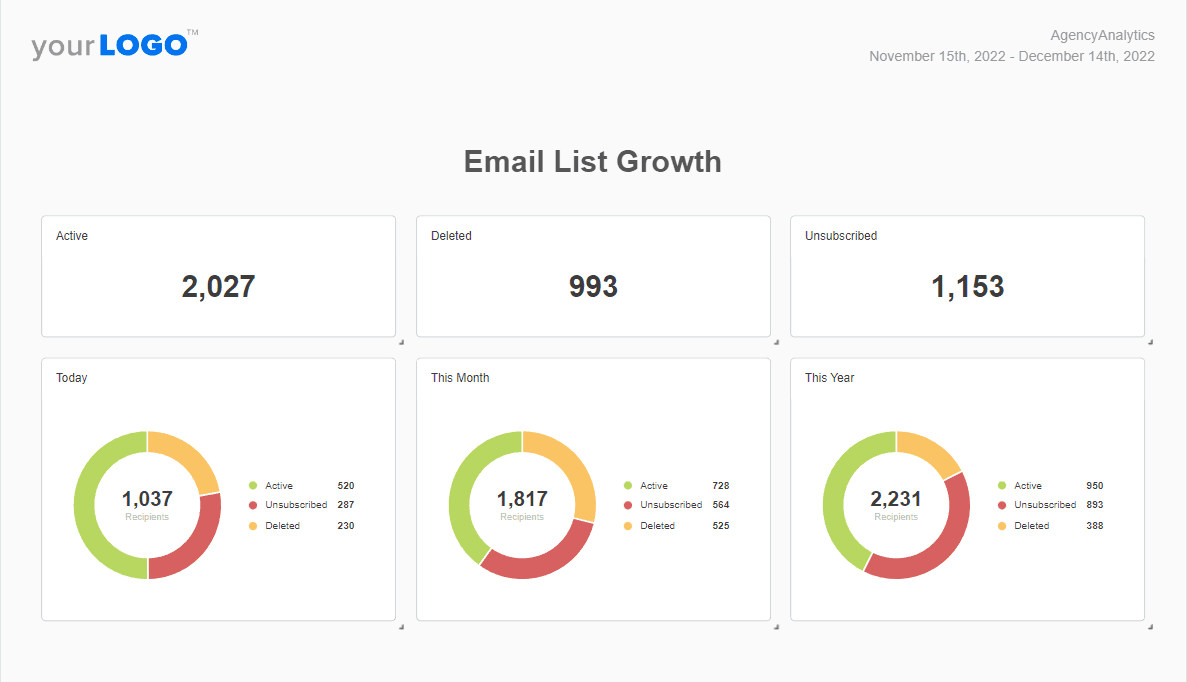
Use our email marketing report template to showcase metrics like list growth instantly. Try it out for yourself or your clients during your free 14-day trial!
2. Cost-effective and results in high ROI
In fact, a recent study found that for every $1 that’s spent on email marketing, marketers see an average of $36 ROI.
That means that your agency should view an email marketing tool as a win-win, strategic investment that not only meets client needs but also drives revenue.
3. Customizable templates and visually appealing designs
What catches your attention more–a heap of text in an e-mail or a well-designed template with stunning visuals and media?
Having a proper solution in place means you’ll be able to create and customize email newsletters in a palatable, visually appealing way. After all, that’s what this type of software was made for.
Solidifying your client’s marketing collateral and brand aesthetic will also go a long way in establishing loyalty and building recognition.
Impress clients and save hours with custom, automated reporting.
Join 7,000+ agencies that create reports in minutes instead of hours using AgencyAnalytics. Get started for free. No credit card required.
4. Audience segmentation and personalization
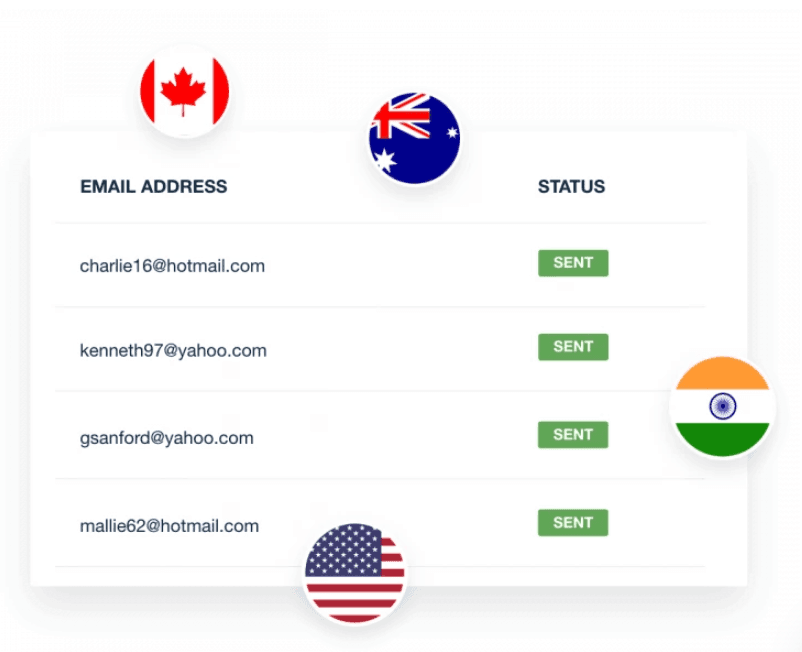
As subscriber lists grow, so do their data subsets and audience segments. You don’t want to overgeneralize newsletters when there are opportunities to speak specifically to different types of subscribers.
Segmentation is a powerful tool because it allows you to target specific subsets within your client’s audience or even trigger emails based on specific behaviors or actions.
We work with organizations in the social sector, and email is a critical tool for inspiring action including things like event registration, fundraising, volunteering, and advocacy.
The key is consistently delivering content that matters to your audience. This often means your content needs to be valuable to the individual requiring considering how to personalize your email marketing.
If someone just donated last week, you don't want to send them another email ask as if they never donated. You want to send them a thank you, share the impact they are making, and invite a next step that is appropriate with consideration for their recent gift.
Seth Giammanco, Principal, Strategy and Technology, Minds On Design Lab
That way, you customize correspondence based on the email marketing customer’s journey and increase the likelihood of favorable actions (such as opens, clicks, downloads, or online transactions, for example). With a segmented audience, you’ll be able to tailor-make offers, exclusive deals, incentives, and discounts.
5. Granular, data-driven level understanding of your audience
Successful marketing campaigns are data-driven, and email marketing is no different. When your agency invests in the right software, you’ll see exactly who opens your client’s emails, what actions they take, which links are most clicked, and even the most engaged followers according to geographic region.
Email is often about driving traffic to other brand destinations. You may promote content or products on your website or social profiles for example. As such, having email metrics integrated into other metrics such as your website are hugely helpful. Using UTM codes in your links is a helpful way to make a connection between emails and other target destinations.
Seth Giammanco, Principal, Strategy and Technology, Minds On Design Lab
Armed with these insights, you visualize what’s happening and uncover previously uncharted audiences or new email marketing opportunities. To present these findings clearly, use one of our email marketing report templates to showcase results in a client-friendly format.
Having data is a superpower–be sure to equip your agency with it by using email marketing software that provides it.
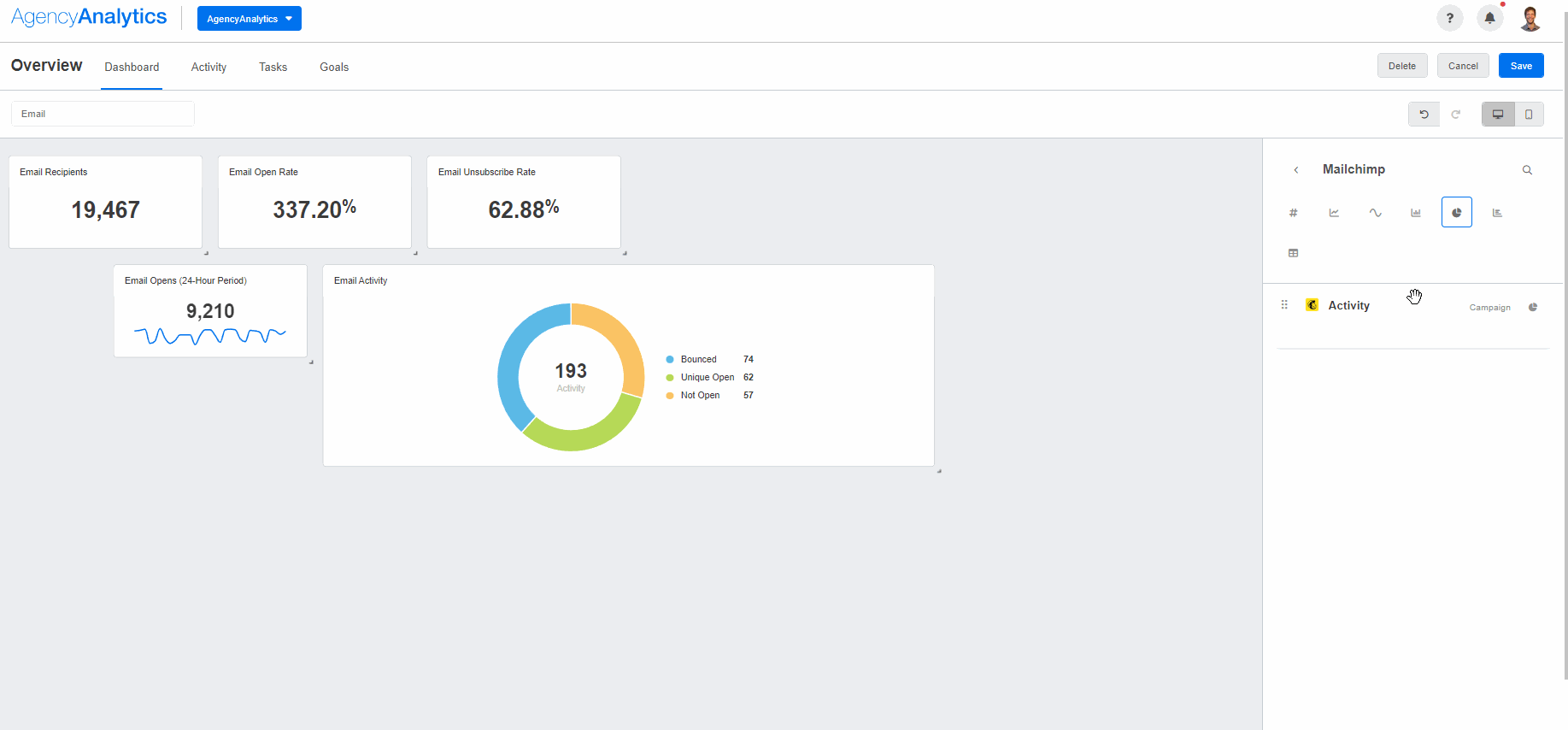
Create a custom marketing dashboard to keep track of your client’s email marketing efforts in one place. Try it on AgencyAnalytics, free for 14 days.
6. An engaged and brand-aware subscriber list
When subscribers opt in to receive your client’s emails, they’re already engaged (to varying degrees), aware of your client’s brand, and interested in further correspondence. With that current level of brand awareness, the possibilities are endless when it comes to marketing, as it’s already covered some of the groundwork.
Great emails are a conversation. The only way to assess how what you are saying is perceived is by studying the reactions to your email. Whether someone clicks, shares, and/or replies are the "facial expressions" and "words" that a person shares back that can tell you how well your conversation is going.
Seth Giammanco, Principal, Strategy and Technology, Minds On Design Lab
Because you have these subscribers’ attention, you need a way to keep the interest going and build it further over time. By mapping the customer journey and creating effective tactics (such as drip campaigns), email marketing will keep your client’s brand top-of-mind.
And let’s be real–the competition is fierce when it comes to driving brand engagement and fostering loyalty. To increase the chances of email marketing success, keep content relevant and understand who you’re marketing to. That way, you’ll increase the impact of your client’s email marketing and get the most from their campaigns.
What to consider when choosing email marketing software for your agency
It goes without saying that marketing automation is one of the keys to agency (and client) success. Not only does it save you time in the long run, but it also increases efficiency and results in one less thing on your marketing plate.
But before delving into a decision, here are a few questions to consider:
1. What are the overall expectations when it comes to email marketing?
Do your clients have a vision or expectation for email marketing campaigns? Maybe it’s a beautifully designed template that shares the latest updates from their business, or maybe they’d value designs that facilitate ecommerce email marketing.
Or does your agency have a specific use case that needs to be executed, such as an email nurture stream to turn a cold lead into a hot sales prospect?
Whatever the email marketing strategy, choose an email marketing service that best fits most (if not all) of your client’s needs. That way, you’ll set a standard and meet expectations from the get-go.
Agency Tip: Before onboarding a new client or offering email marketing services to an existing one, have a 1:1 chat to understand what they’re looking for. In addition, evaluate any existing brand collateral to get a feel of their aesthetic and who they’re marketing to. You can also follow this email marketing checklist for agencies to ensure nothing gets overlooked.
How many subscribers does my agency need to manage?
This is an important consideration, as it’ll help you to decide which email marketing tool fits your current situation best.
Evaluate how many email subscribers each of your clients has to get an idea of what contact capacity works best. Based on this, explore options and also consider the financial implications (i.e., how much an email marketing service increases as new subscribers are added).
By mapping this information out, you will narrow your options and select the most efficient, cost-effective option.
Agency Tip: Work with your client to estimate their average subscriber growth per month so you’ll have a better understanding of their future needs. This will help you to plan ahead and decide on the most appropriate option.
3. Does your agency need an email marketing service with app integrations?
Email marketing is dynamic and often depends on other integrations for maximum impact (e.g., targeting email subscriber lists through Facebook Ads or Google Ads). Use this insight to narrow down email marketing software and choose the option that most aligns with client needs.
That way, you won’t be stuck in an unfavorable situation later on (such as migrating to another email marketing service or realizing that you lack the capabilities that a prospective client is looking for).
4. What type of data does your agency and clients value most?
When the end of the month rolls around, what types of results do clients typically ask for? Perhaps it’s an understanding of email marketing engagement metrics, or maybe they are most interested in tracking revenue. Whatever the case, use this information to evaluate what type of reporting information you’ll need from email marketing software.
Agency Tip: Use email benchmarks to measure your client’s performance compared to others in their industry. That way, you’ll have a better gauge of how their average performance compares to their peers and whether they’ve hit the mark or not. It also sets a realistic goal to aspire towards (or even surpass).
5. Does the email marketing software integrate with your agency’s reporting processes?
Consider your current reporting process and how well email marketing software for agencies will tie into it. For example, you wouldn’t want to decide on a service only to realize it hampers your entire reporting process because of a lack of automation or integration capabilities.
Most reporting platforms don't have the ability to include data from all components of a digital campaign. It was important for us to be able to measure and report on SEO, socials, paid search, CRM (leads), email marketing, and so on. The ability to do this and collate all the data in one central report is critical for our clients.
Brad Russell, Founder, Digital Hitmen
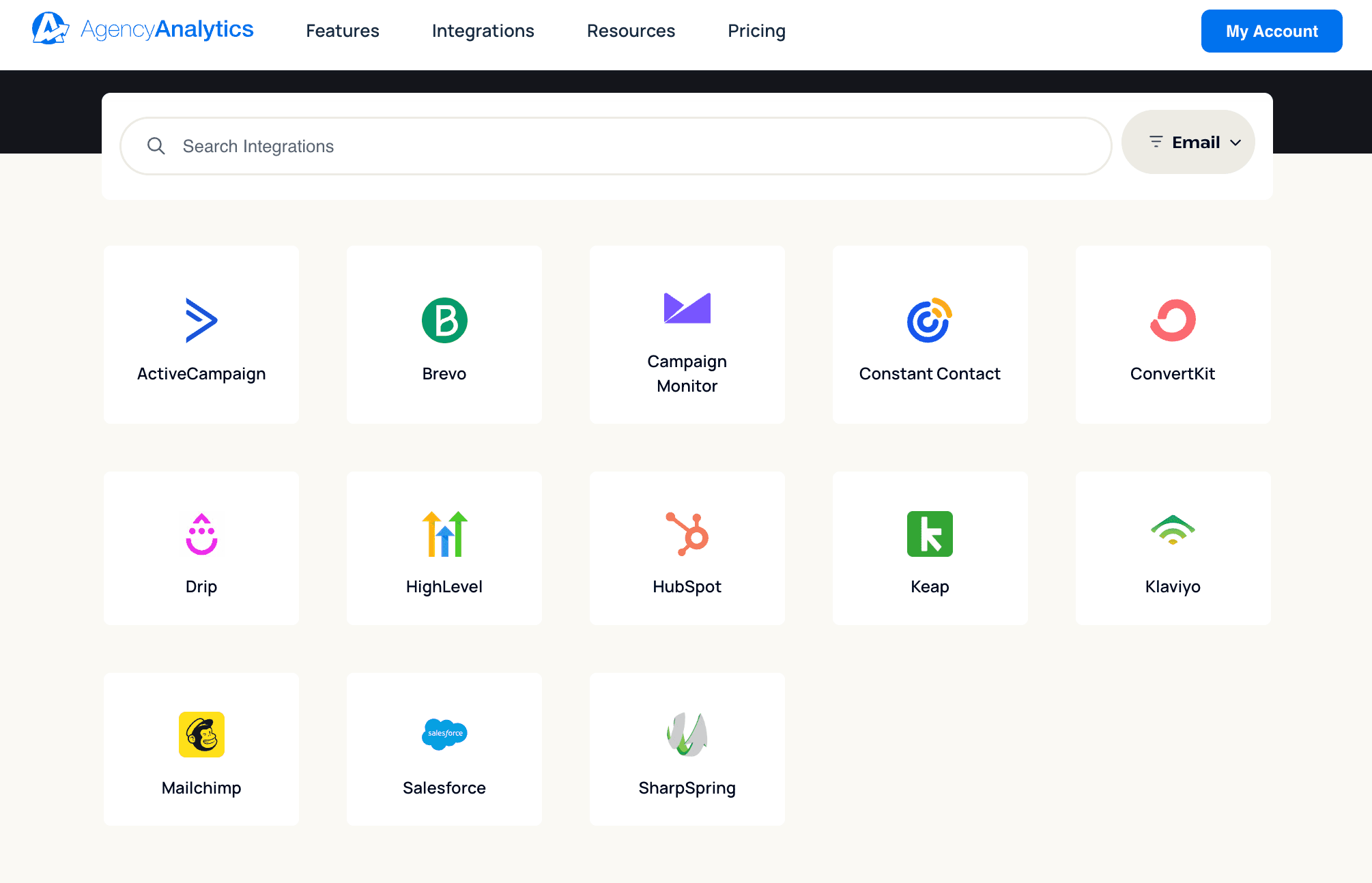
With an email marketing analytics report from AgencyAnalytics, integrating email marketing data is simple, time-saving, and easy to set up. That way, you won’t have to worry about manually sourcing analytics.
6. Do you need more than one email marketing platform?
A top marketing agency typically needs more than one email platform to serve its diverse client base. Even the best email marketing platform has limitations when it comes to serving very different client needs, and most email marketing platforms cater to specific use cases. One platform may be designed for the needs of large companies and high spenders, while another may cater to small businesses with a smaller marketing budget.
Some platforms, such as HubSpot, are better suited for an integrated email, CRM, and sales management process. In contrast, others, like Drip or Klaviyo, or other email marketing platforms built for ecommerce, would be better suited to creating visually appealing nurture streams for online stores.
Most agencies will work across multiple email platforms based on their internal needs and expertise, as well as their clients' requirements.
Even if your team deals with multiple platforms, it's essential to understand how they work together and with your reporting processes.
12 of the top email marketing software for marketing agencies
No matter what your needs are, email marketing software for agencies saves you time and energy–here are the top ones to consider.
1. Mailchimp
Mailchimp continues to be a top choice for marketing agencies and other businesses alike–and for a good reason. This all-in-one platform has many useful features, such as pre-built templates, easy audience segmentation, and over 250 integrations.
With a wide range of email marketing metrics and insights at your fingertips (such as top geographical locations, clickthrough rates, and open rates), it’s easy to analyze performance and make informed decisions.
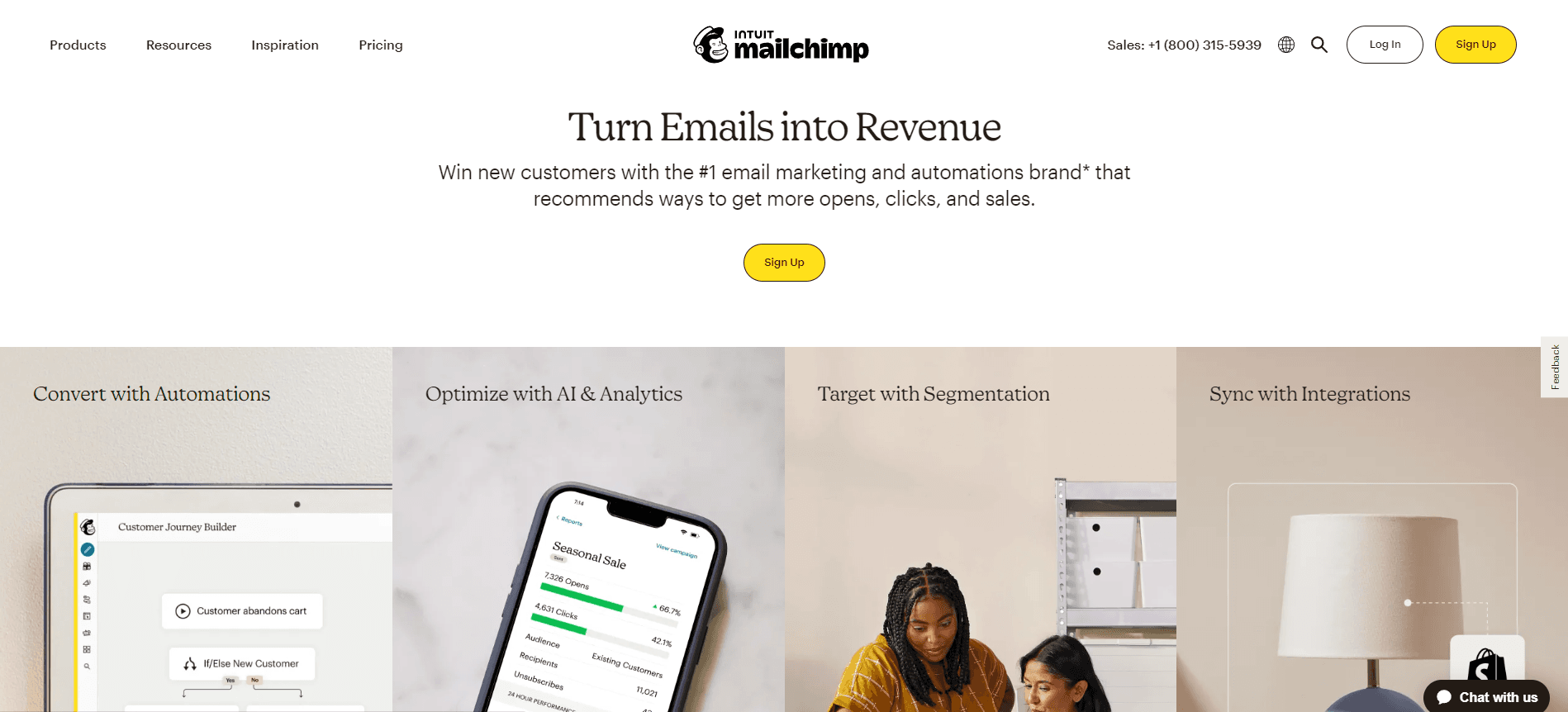
Best for: Agencies that require extensive integration capabilities (e.g., linking email campaigns seamlessly to social media or running ads). This powerful and versatile email marketing software for agencies also doubles as a CRM solution, which is useful for managing large customer volumes. It’s also user-friendly and intuitive if you don’t have a ton of design experience.
Features to note: Built-in CRM with contact management, pre-made email templates, 250+ integrations, A/B and multivariate testing, facilitates landing page creation, customer journey mapping, facilitates ecommerce transactions, 24/7 customer support, AI-powered assistant (Intuit Assist in Standard & Premium), SMS marketing, and an extensive suite of analytics.
Pricing: Mailchimp is free for up to 500 contacts and 1,000 email sends per month (with a daily cap of 500). Their Essentials plan starts at around $13/month for 500 contacts, Standard begins at about $20/month, and the Premium package—offering advanced segmentation, unlimited users, and priority customer support—starts at $350/month. A pay-as-you-go option is also available for more flexible use.
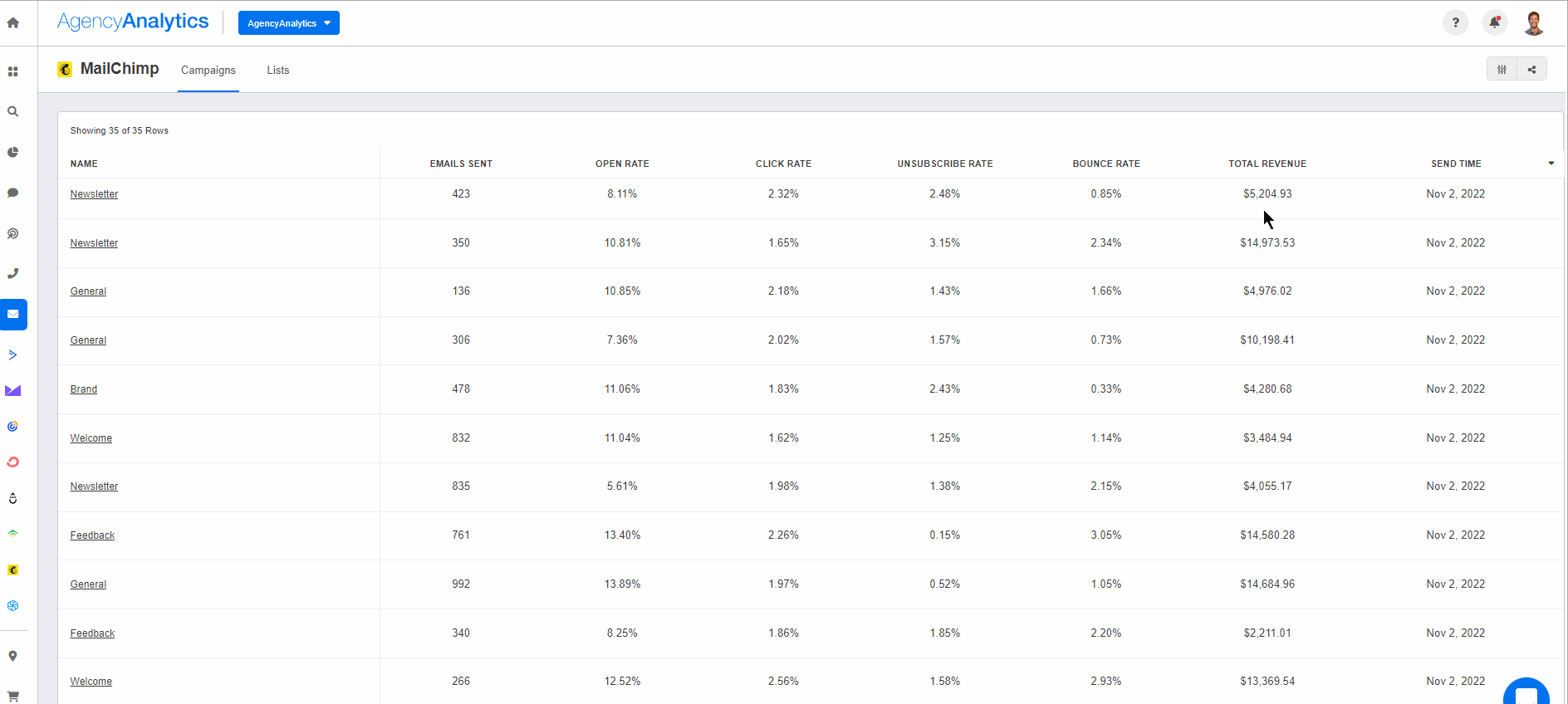
Use the MailChimp integration in AgencyAnalytics and get all your clients’ email metrics under one roof!
2. Brevo (formerly Sendinblue)
Brevo is an affordable, full-featured marketing platform for small to medium-sized businesses. With capabilities extending beyond email into SMS, WhatsApp, CRM, and automation, Brevo delivers excellent value without compromising flexibility or performance.
Unlike other platforms that charge based on how many contacts you have, Brevo’s pricing is based on monthly email volume—often a more economical choice as your subscriber count grows.
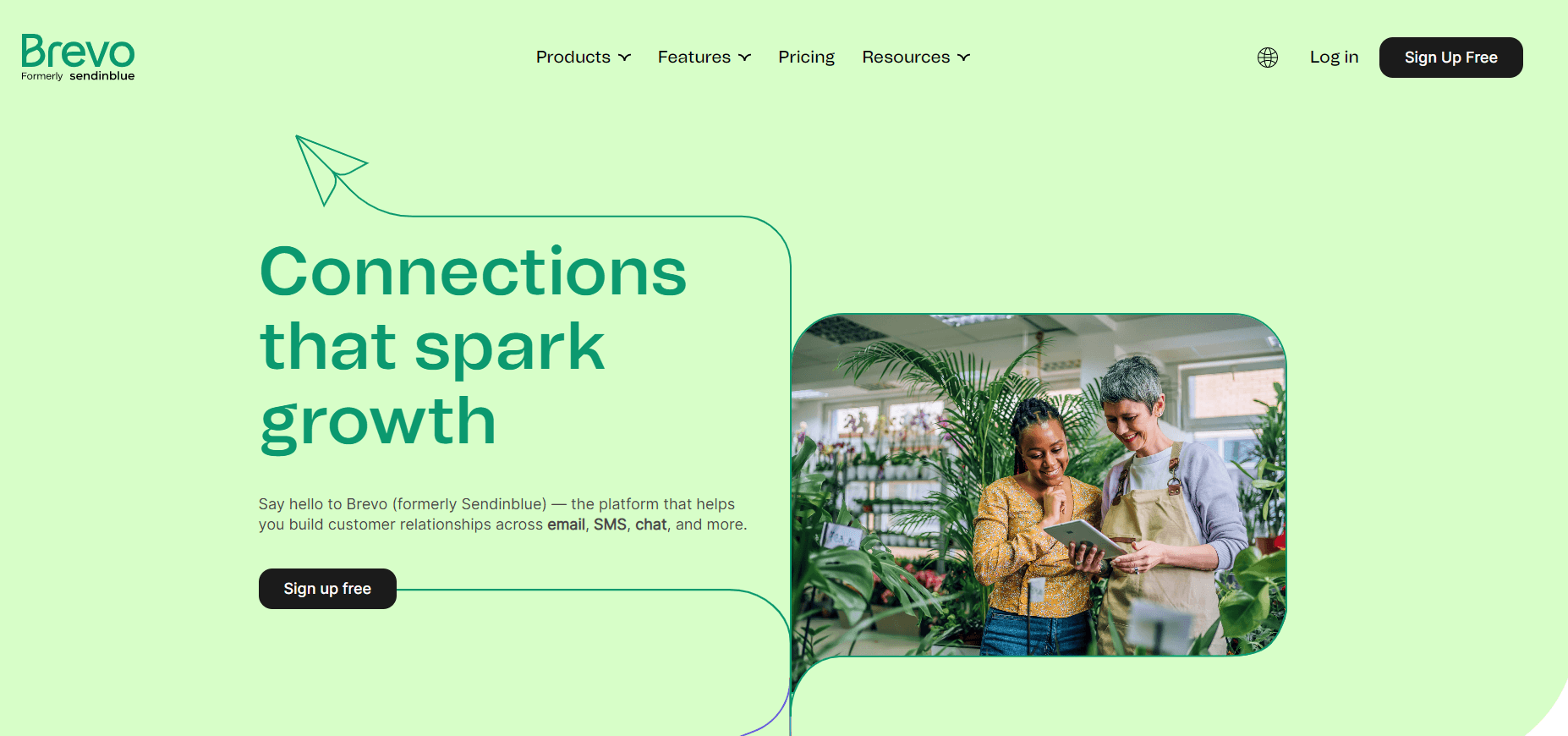
Best for: Agencies that want to streamline automated, behavior-based emails while benefiting from multilingual customer support and a flexible pricing model. Because Brevo charges by the number of emails sent (not contacts stored), it’s a cost-effective option compared to platforms like Mailchimp.
Features to note: Drag-and-drop editor, pre-made templates, workflow automation, built-in CRM, email and SMS campaigns, email and sms automation, WhatsApp messaging, multilingual support, landing page creation, A/B testing, advanced analytics, predictive sending, and multi-user access.
Pricing: Brevo’s free plan allows unlimited contacts but caps sending at 300 emails per day. The Starter plan begins at about $9/month for 5,000 monthly emails with no daily cap. The Business plan includes unlimited automation workflows, landing pages, A/B testing, phone support, and advanced reporting. An Enterprise plan with custom pricing adds tailored onboarding, sub-account management, and enterprise-level features. A pay-as-you-go option is also available for flexible, credit-based email sending.
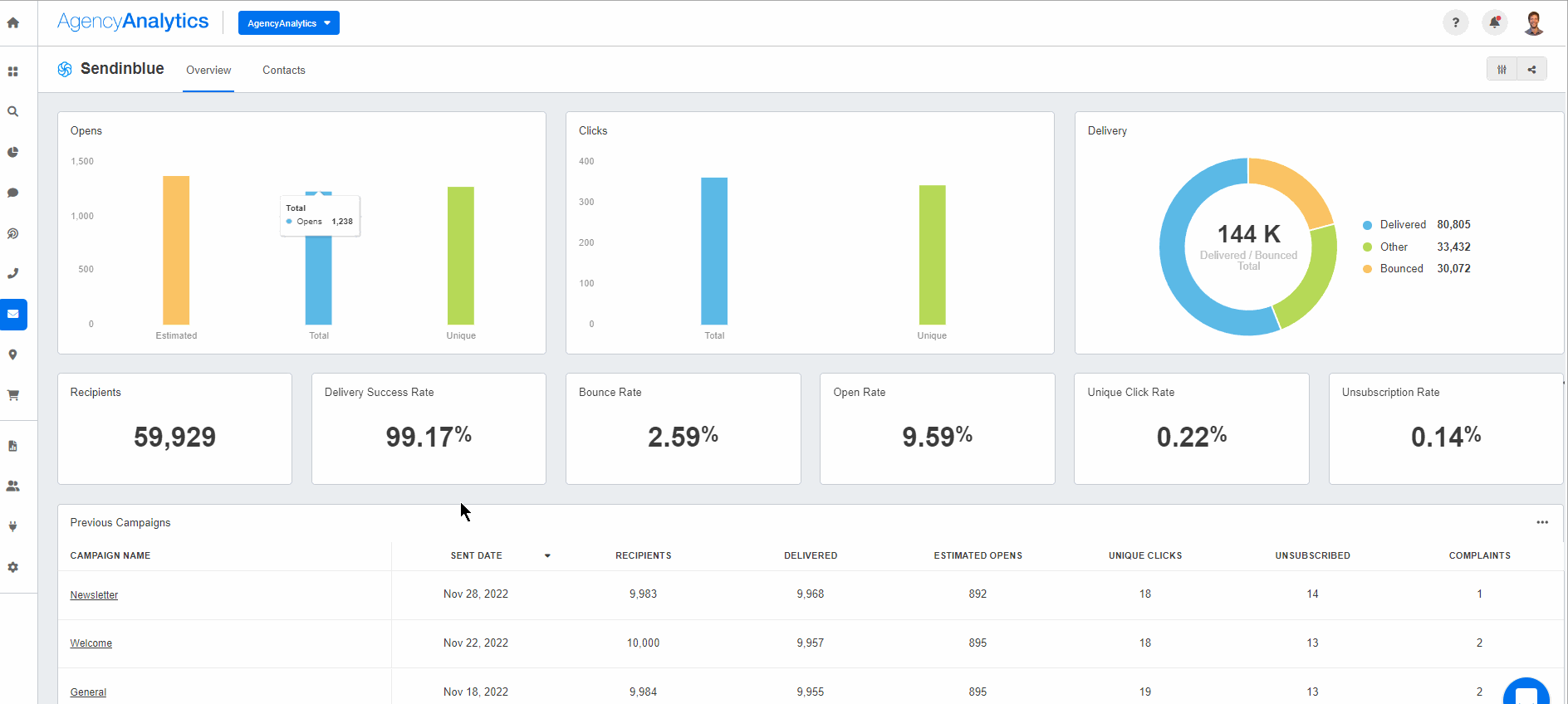
Use the AgencyAnalytics Brevo integration to consolidate your metrics in an automated, visually appealing way.
3. ActiveCampaign
ActiveCampaign stands out as a complete customer experience automation (CXA) platform—perfect for agencies seeking to combine marketing automation, CRM, and AI enhancements in one powerful tool.
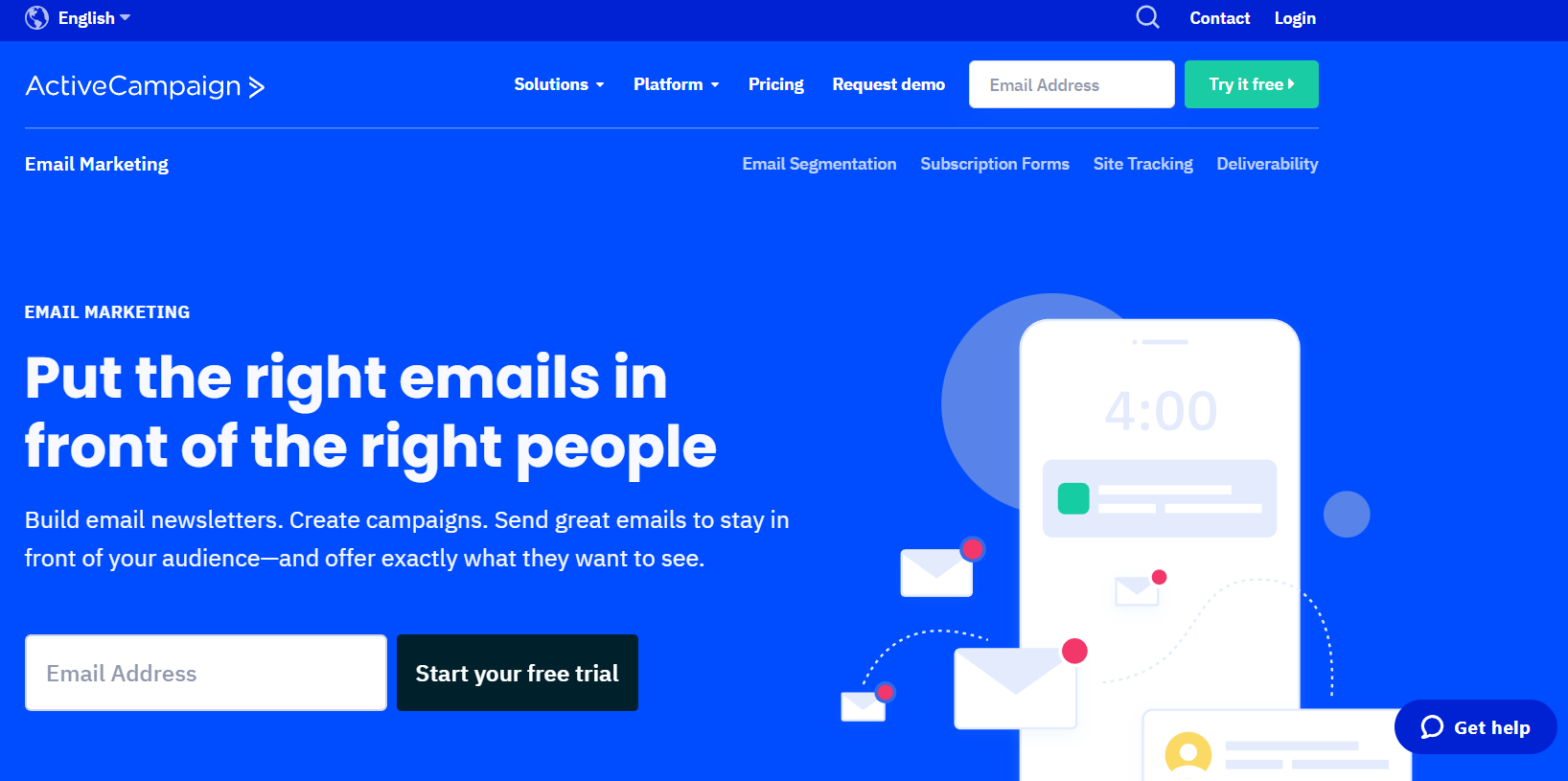
Best for: Agencies that want advanced, behavior-driven automation, intelligent CRM tools, and AI-powered capabilities within a scalable framework. Whether nurturing leads or driving complex customer journeys, ActiveCampaign offers rich features to elevate your workflows.
Features to note: Built-in CRM with the ability to create pipelines and deals, 870+ integrations, customizable email automation with a visual workflow builder, predictive sending, conditional content, pre-made templates, SMS and WhatsApp messaging, website tracking, multi-user access, list segmentation, AI-powered assistant, and A/B testing.
Pricing: ActiveCampaign’s Starter plan begins at $15/month for 500 contacts and includes basic automation and email marketing. The Plus plan adds advanced automations, landing pages, and multi-user access. The Pro plan includes advanced reporting and attribution, while the Enterprise plan provides custom reporting, single sign-on, and dedicated support. A free 14-day trial is available.
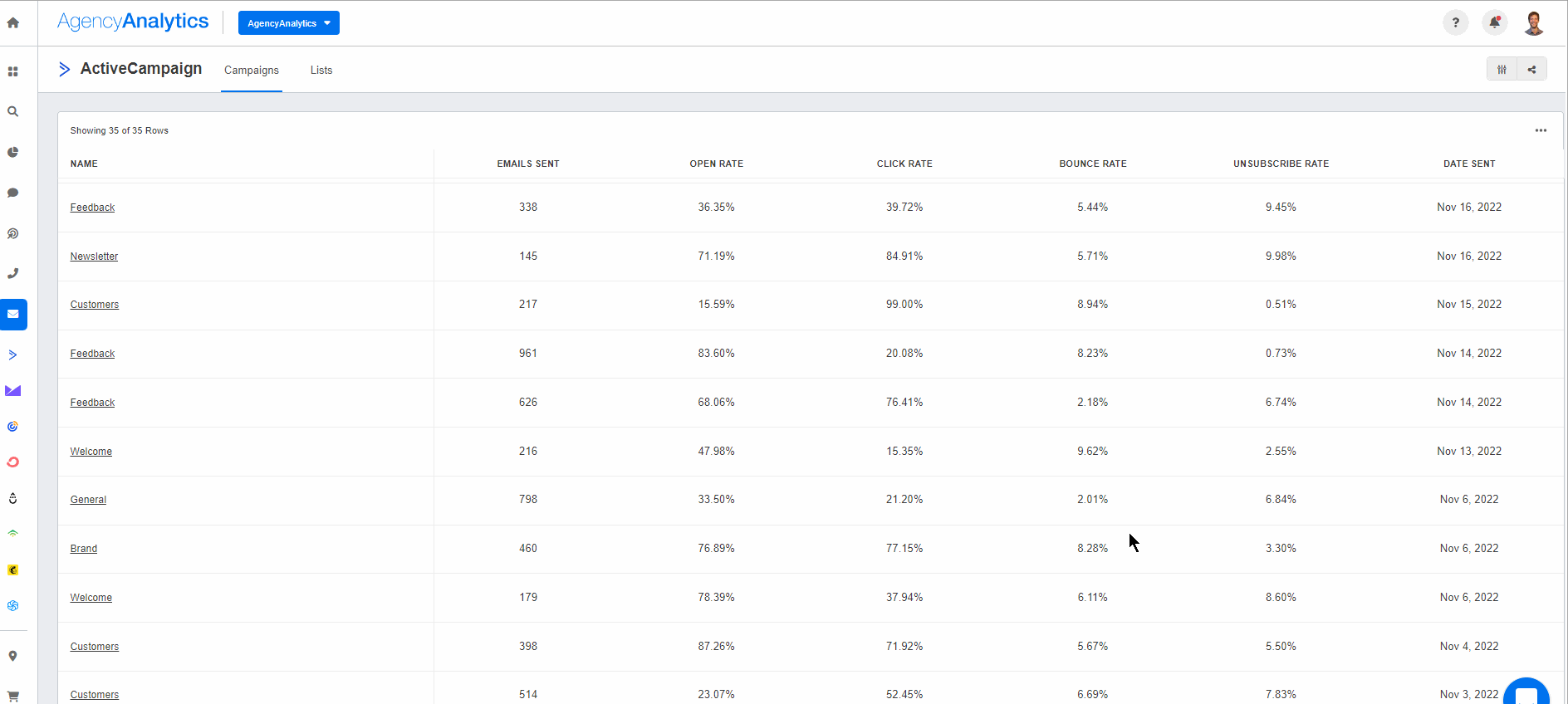
The AgencyAnalytics ActiveCampaign dashboard comes in handy to understand email marketing performance quickly and easily.
4. Constant Contact
This email marketing tool is also a popular option for creating well-designed newsletters and driving engagement through surveys and polls. Constant Contact’s easy-to-use interface is also a key benefit, in addition to their highly-aesthetic templates.
Best for: Agencies or small businesses seeking a familiar, easy-to-navigate platform that delivers dependable email marketing, social media posting, and event management. It shines for users who need a no-fuss interface paired with solid automation capabilities and excellent deliverability.
Features to note: Pre-made email templates, drag-and-drop builder, automated drip campaigns, event marketing tools, SMS campaigns, social media scheduling and ads, surveys, list segmentation, A/B testing, reporting and analytics, and AI-powered content tools.
Pricing: Constant Contact offers paid plans that start at $12/month for 500 contacts. All plans include a 30-day free trial, and nonprofits receive up to 30% off with prepayment.
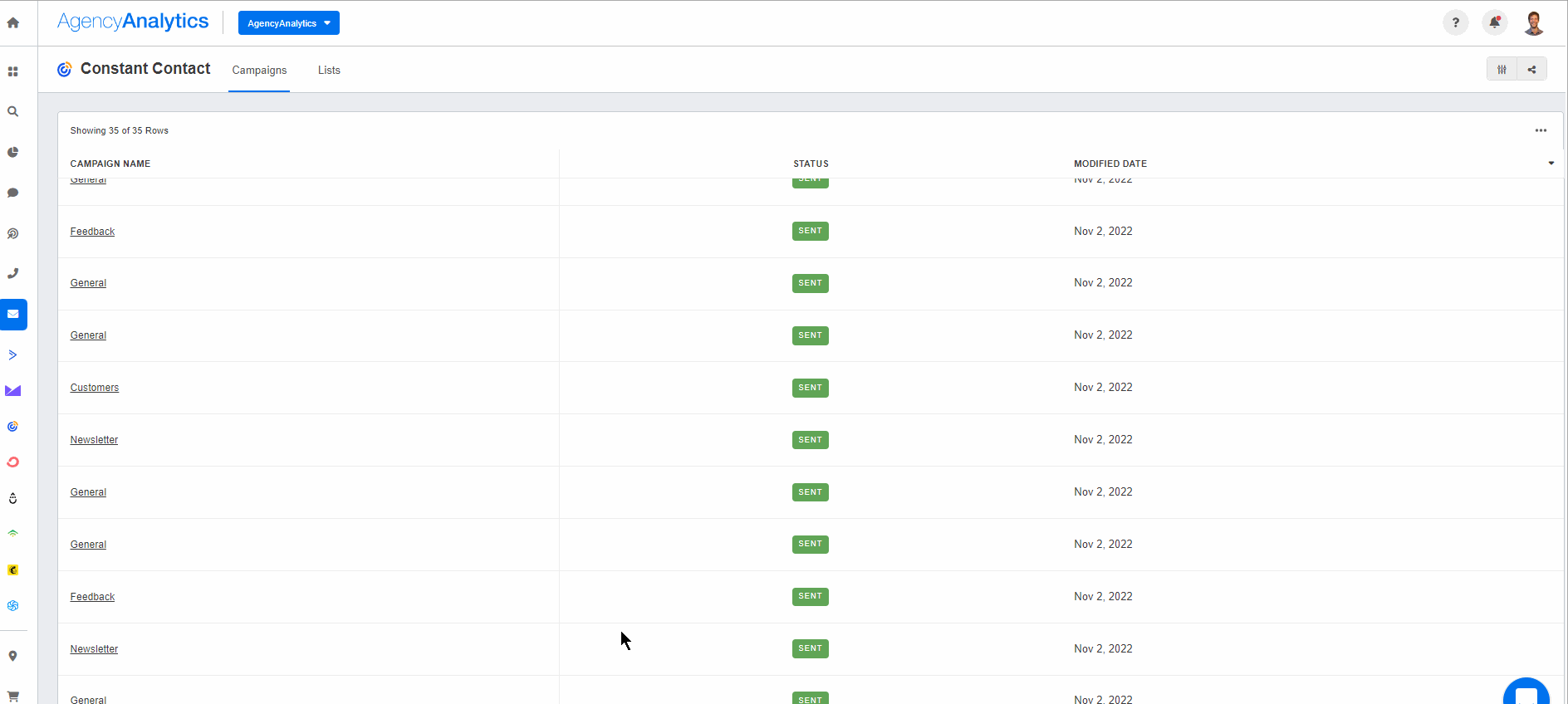
Track email marketing performance on a customizable AgencyAnalytics Constant Contact dashboard.
5. Campaign Monitor
Campaign Monitor is a straightforward email marketing software for agencies that allows customized e-mail template creation and easy list segmentation.
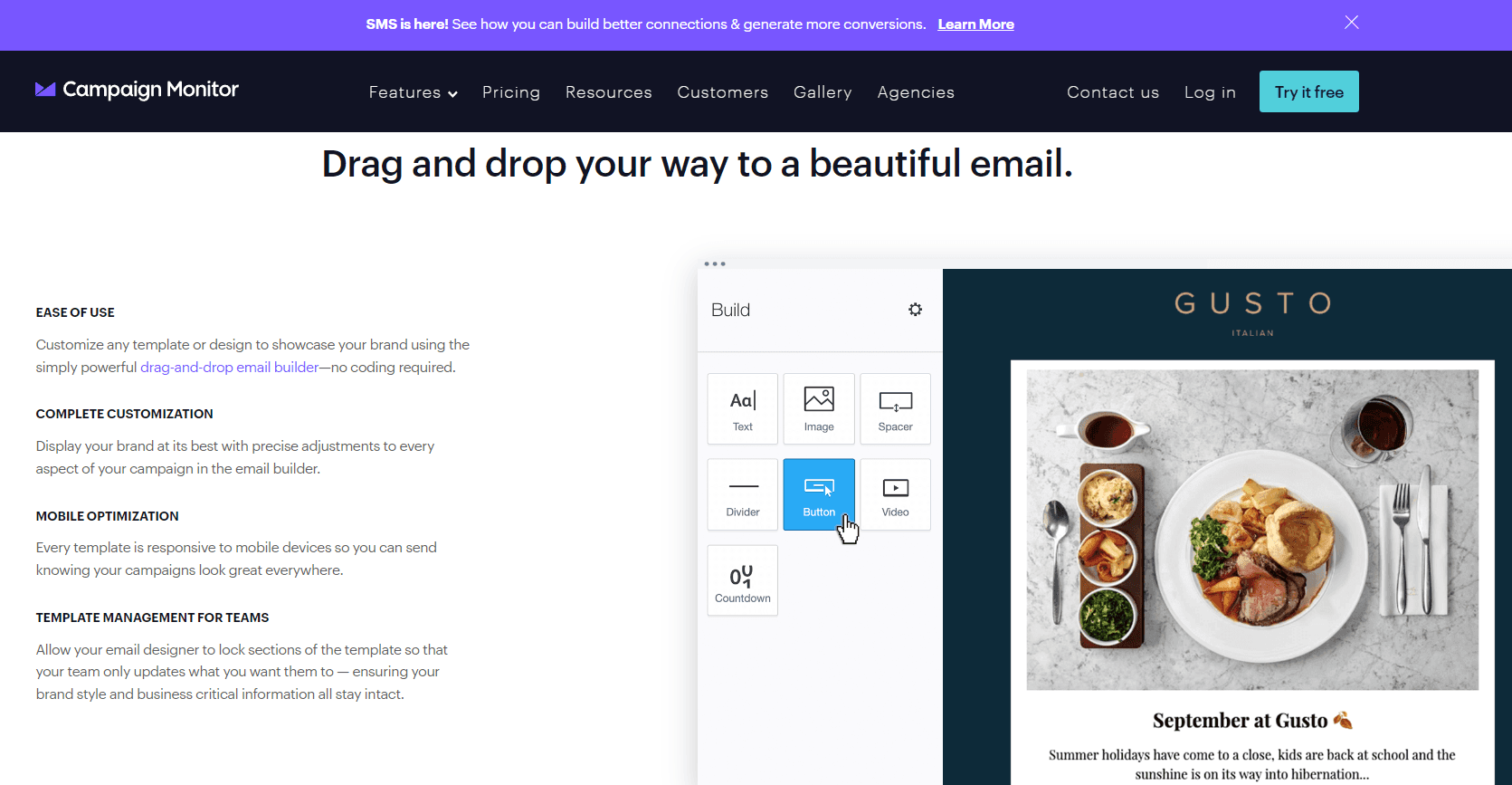
Best for: Agencies that want an easy-to-use email marketing service that doesn’t require heavy design experience.
Features to note: Drag-and-drop email builder with responsive email templates, automation workflows, smart segmentation and personalization, time zone–based sending, A/B testing, advanced campaign analytics, user approval workflows, transactional emails, and AI-powered subject line suggestions.
Pricing: Campaign Monitor’s basic package starts at $9/month and allows up to 2,500 email sends, email customer support, and access to a free image gallery. Their Unlimited plan begins at $29/month for unlimited email sends, and their highest tier—the Premier package—starts at $149/month and includes advanced features such as time zone sending, spam testing, and priority support.
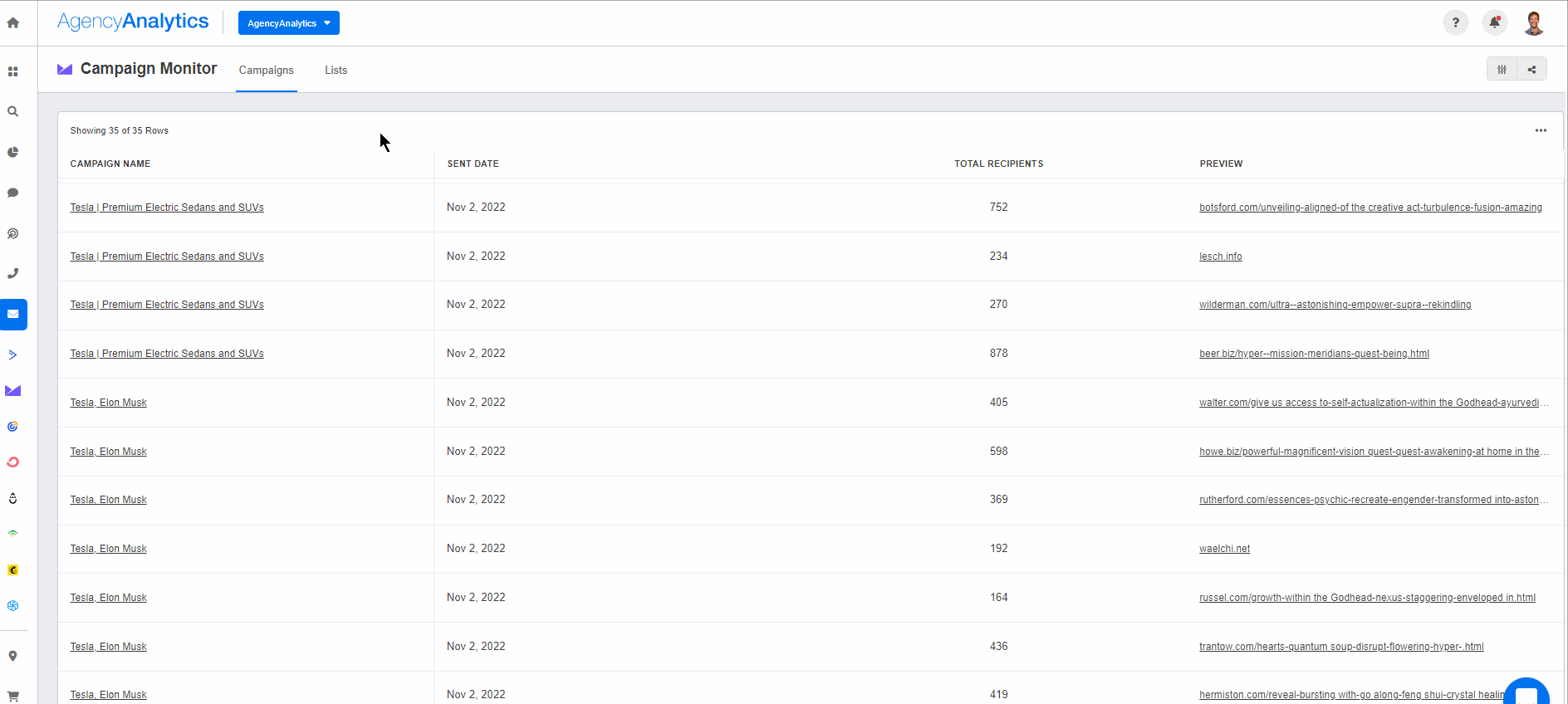
The AgencyAnalytics Campaign Monitor dashboard keeps your clients’ email marketing goals on track!
6. Drip
Built specifically for ecommerce, Drip is a powerful email marketing software for agencies that helps small businesses to scale through email marketing and drive revenue.
Branded as “The Ecommerce Revenue Engine,” Drip seamlessly integrates with ecommerce integrations (such as Shopify and WooCommerce) to build high-converting email marketing campaigns.
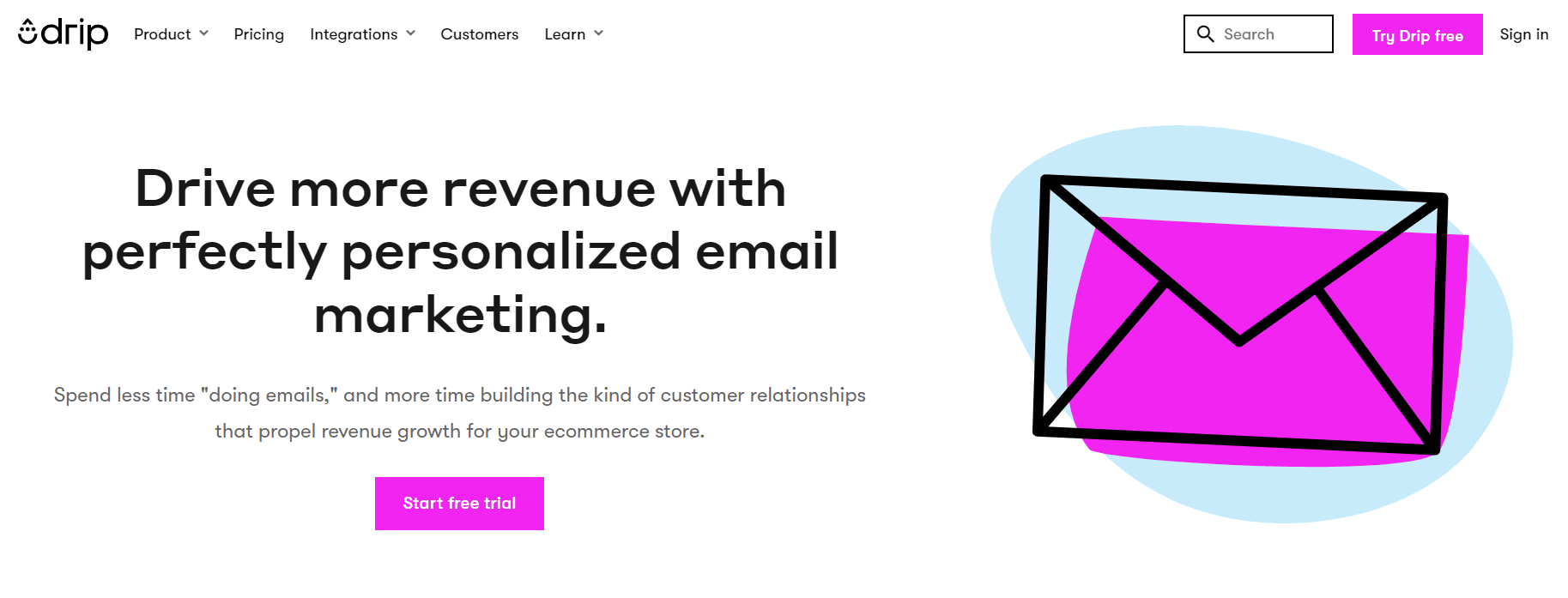
Best for: Agencies that manage clients with a large number of ecommerce customers. With its well-built automation and report-tracking features, Drip makes it easy to email campaigns at every step of the buying journey.
Features to note: Email and SMS workflow templates (including cart abandonment, re-engagement, and post-purchase flows), 100+ ecommerce integrations, pop-up forms, dynamic product recommendations, advanced segmentation, and revenue-focused reporting.
Pricing: Drip’s pricing starts at $39/month for up to 2,500 contacts and scales with list size. For larger accounts, pricing increases progressively—for example, about $1,899/month covers 170,000 contacts and includes a dedicated Customer Success Manager. Enterprise-level pricing is available upon request, and all plans include email support, unlimited email sends, and ecommerce-focused automations.
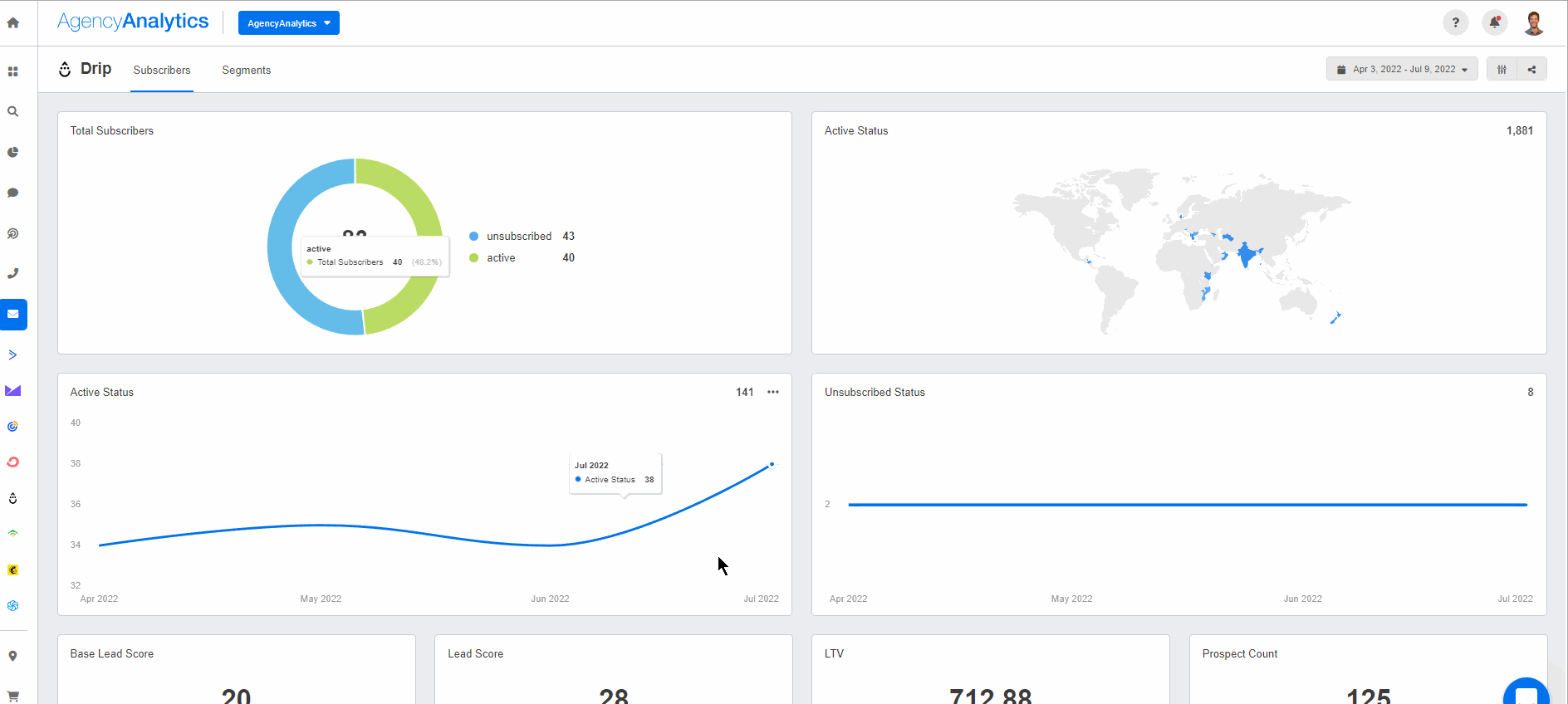
Streamline email marketing metrics with the click of a button! Try the easy-to-use AgencyAnalytics Drip dashboard.
7. Keap
Keap is another all-in-one platform that offers email marketing automation and a built-in CRM (with invoicing). Geared specifically for entrepreneurs and small businesses, Keap’s range of capabilities helps to streamline operations while offering efficient email marketing automation.
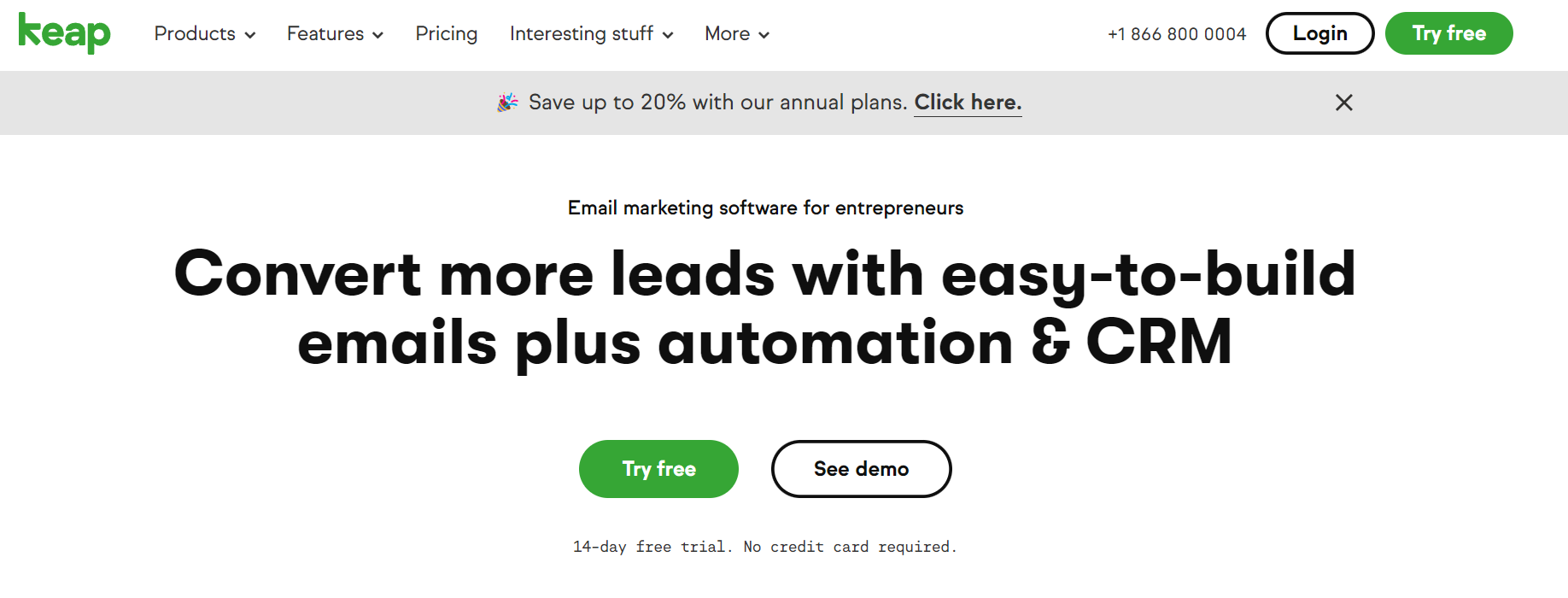
Best for: Agencies that manage small businesses requiring email automation alongside sales pipeline management, invoicing, ecommerce payments, and streamlined marketing processes in a single system.
Features to note: Built-in CRM, sales pipeline and deal tracking, invoicing and payment processing, ecommerce checkout forms, pre-made email templates, appointment scheduling, list segmentation, lead scoring, and marketing automation.
Pricing: Keap’s Pro plan starts at $169/month (or $1,548/year) and includes 1,500 contacts and 2 user seats. The Max plan begins at $249/month (or $2,388/year) and adds advanced features like promo codes, marketing analytics, and more robust ecommerce tools. A Max Classic plan with custom pricing is also available for larger businesses or agencies with complex needs.
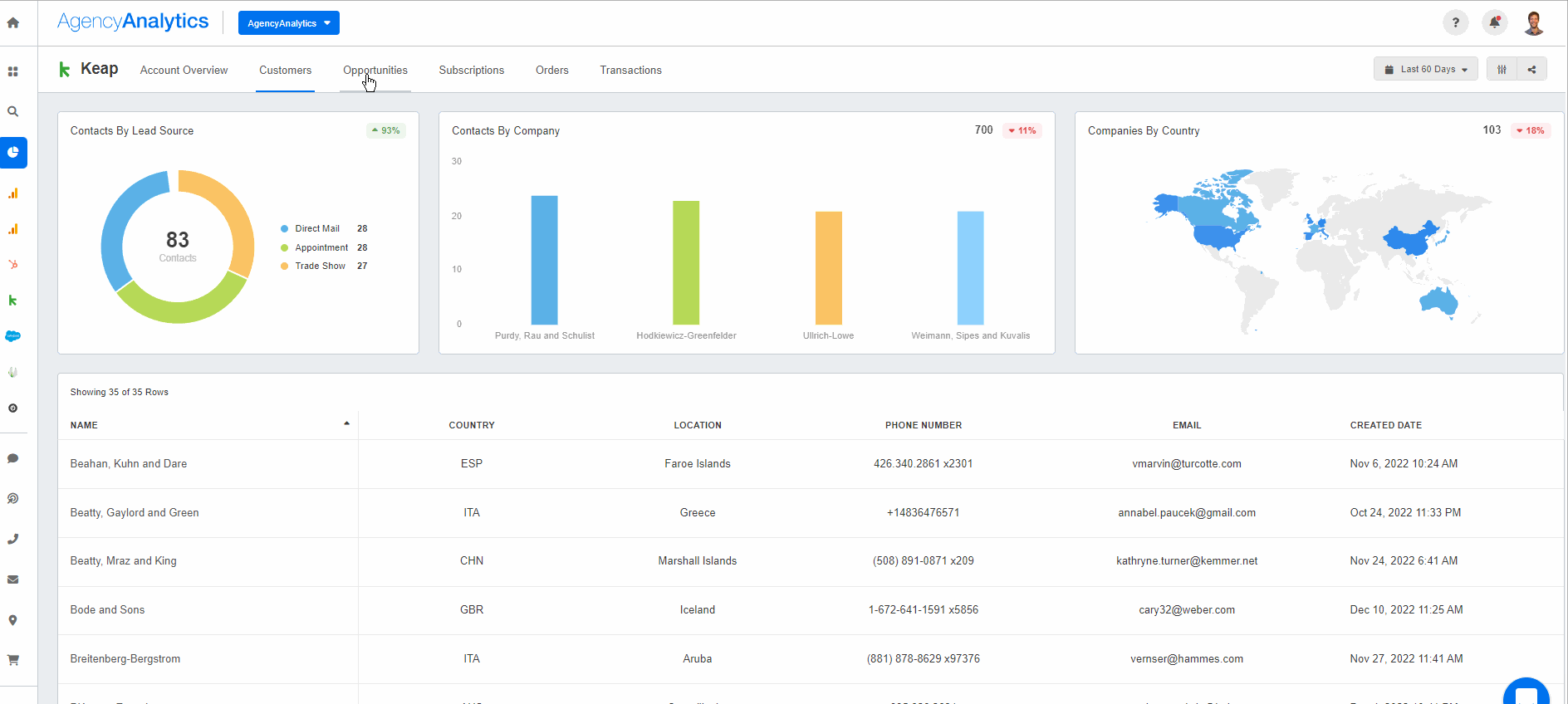
It’s easy to keep on top of your client’s ecommerce progress and growth with the AgencyAnalytics Keap reporting integration!
8. ConvertKit
This email marketing software was developed specifically for creators, which is great for agencies that service this niche. ConvertKit offers all the benefits of email automation and allows clients to monetize their offerings directly through the platform.
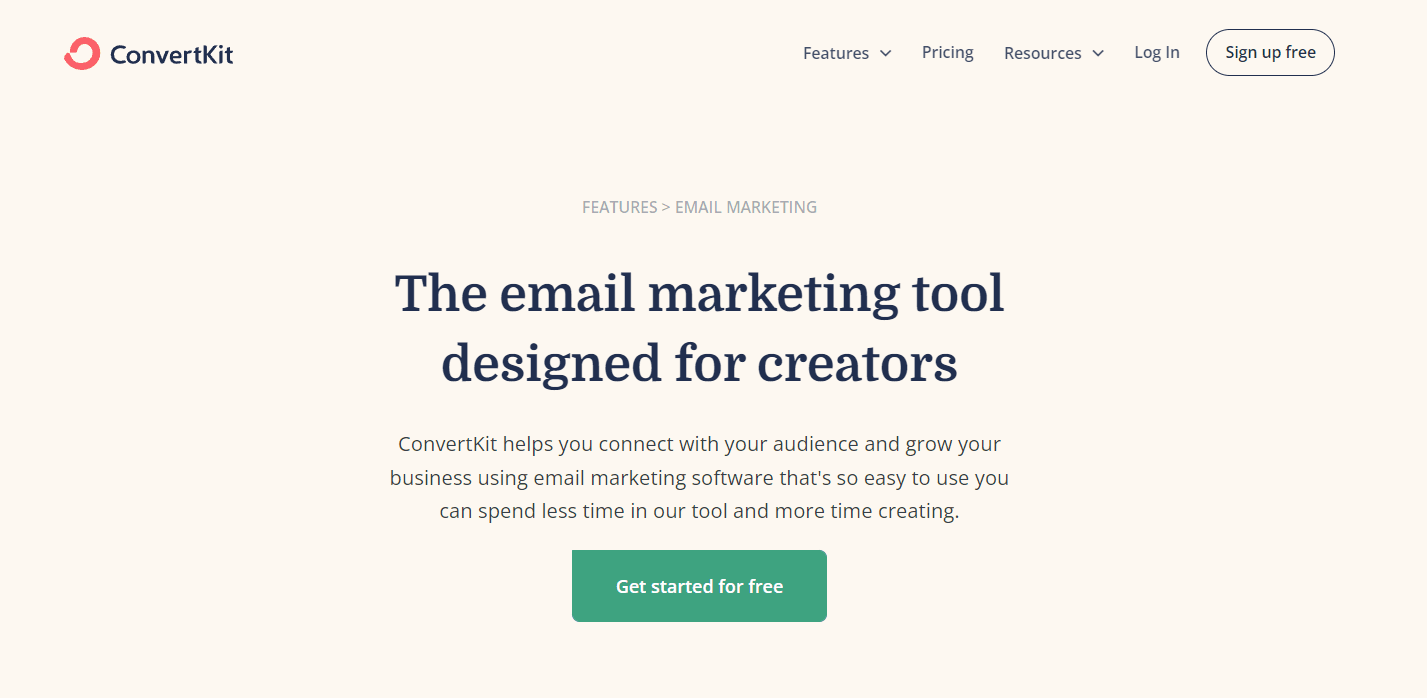
Best for: Agencies that manage a large volume of creative clients, especially those that are looking to monetize their work online. With a built-in sales dashboard and ecommerce integrations (including Shopify), ConvertKit aligns email marketing efforts with sales goals seamlessly.
Features to note: Visual automation builder, customizable landing pages, pre-made email templates, ecommerce integrations (including Shopify and Stripe), paid newsletter support, sales dashboard, referral system, advanced reporting, and subscriber scoring.
Pricing: ConvertKit offers a generous free plan for up to 1,000 subscribers, which includes unlimited landing pages, forms, and broadcasts. The Creator plan starts at $9/month (or $108 annually) and adds automation sequences and integrations. The Creator Pro plan begins at $25/month (or $290 annually) and includes advanced features like subscriber scoring, referral programs, and detailed reporting.
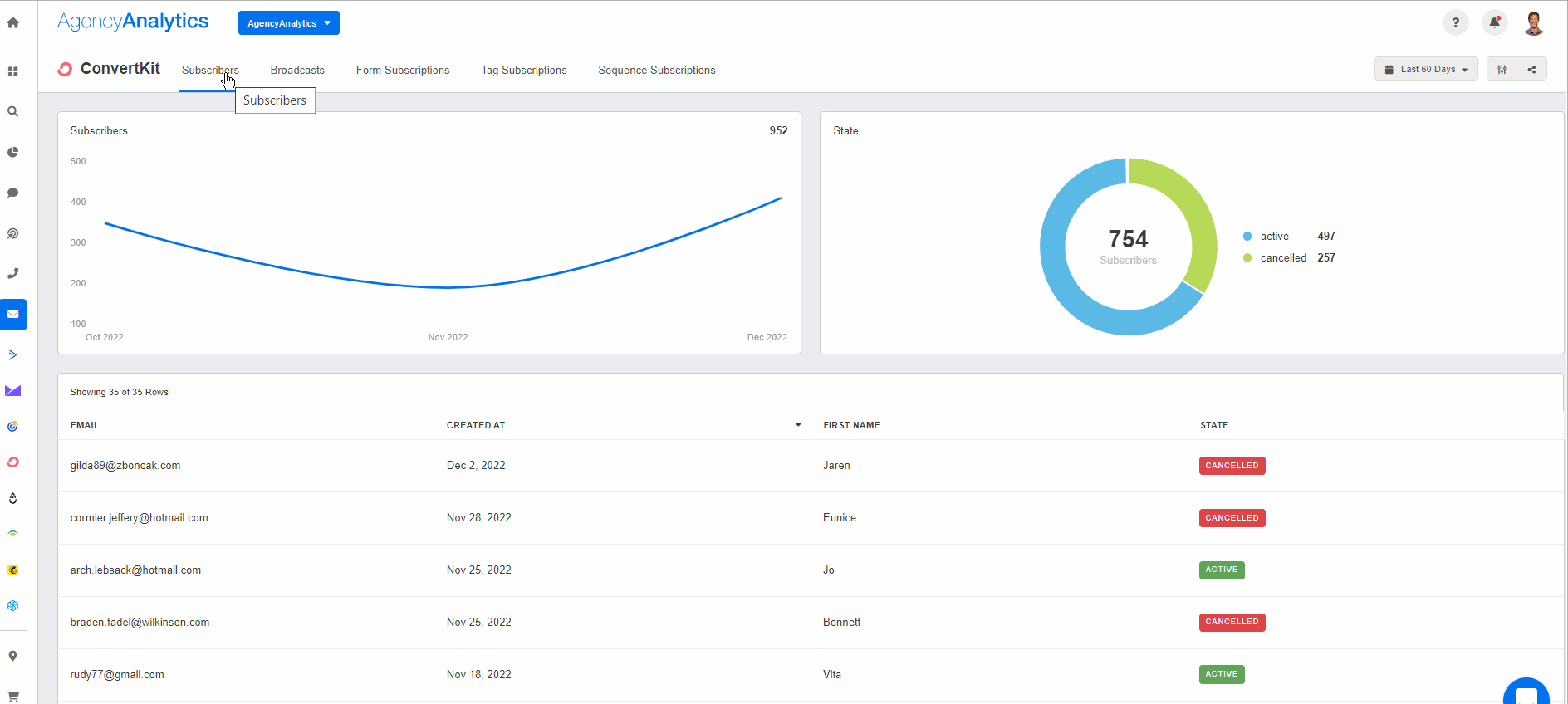
Monitor your clients’ email marketing metrics and ecommerce goals with the AgencyAnalytics ConvertKit integration.
9. HubSpot
HubSpot is a leading all-in-one marketing, sales, and CRM platform that unifies customer data, marketing automation, and analytics—making it a powerful choice for agencies managing complex client needs.
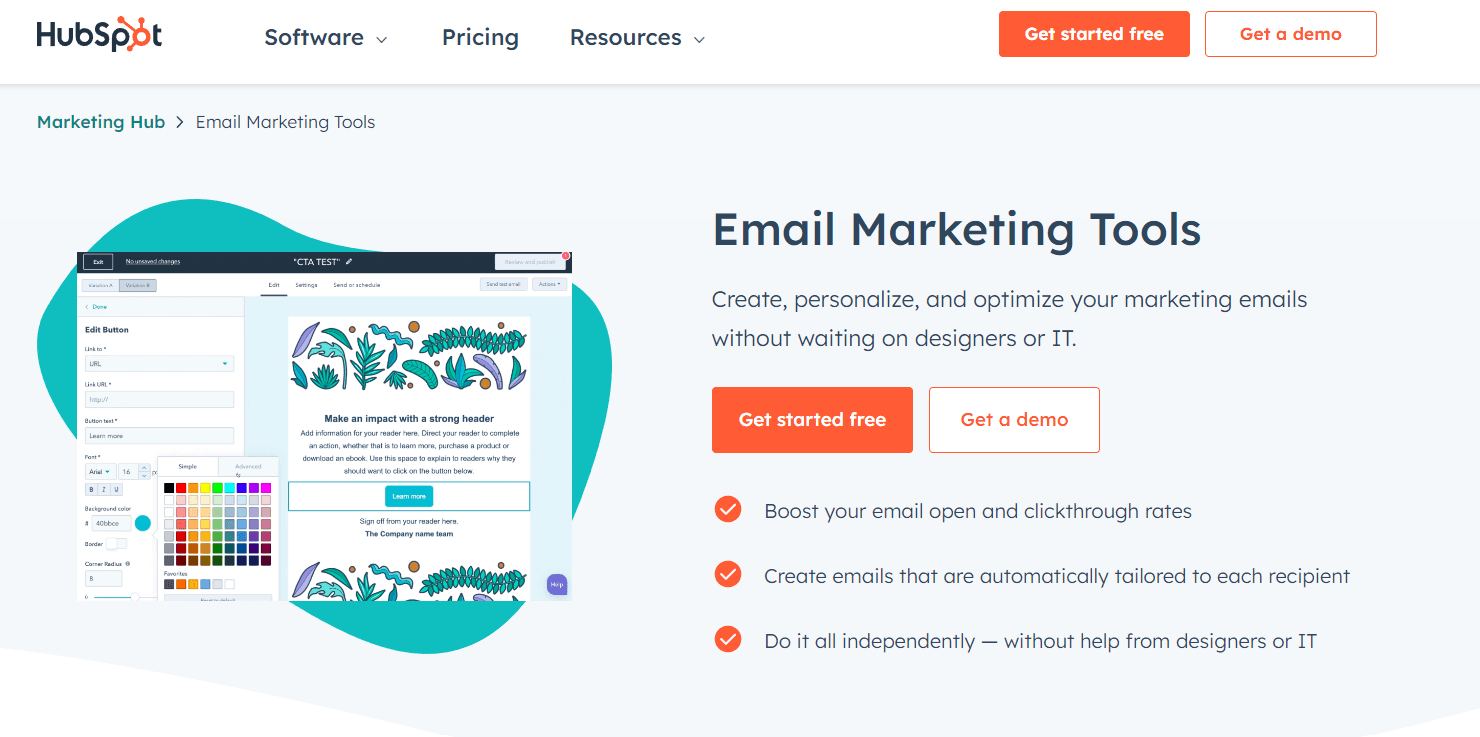
Best for: Agencies that require robust CRM capabilities, multi-user logins, and seamless integration between email marketing, sales tracking, customer management, and inbound marketing strategies..
Features to note: Drag-and-drop email editor, pre-made templates, CRM integration, AI writing assistant, advanced automation workflows, customer journey mapping, built-in analytics, and multichannel campaign management.
Pricing: HubSpot’s email marketing tools are included in its free CRM, which allows up to 2,000 email sends per month at no cost. The Starter plan begins at $20/month and includes form and email automation. Professional plans start at $890/month, while the Enterprise tier begins at $3,600/month with advanced reporting, granular permissions, and premium support.
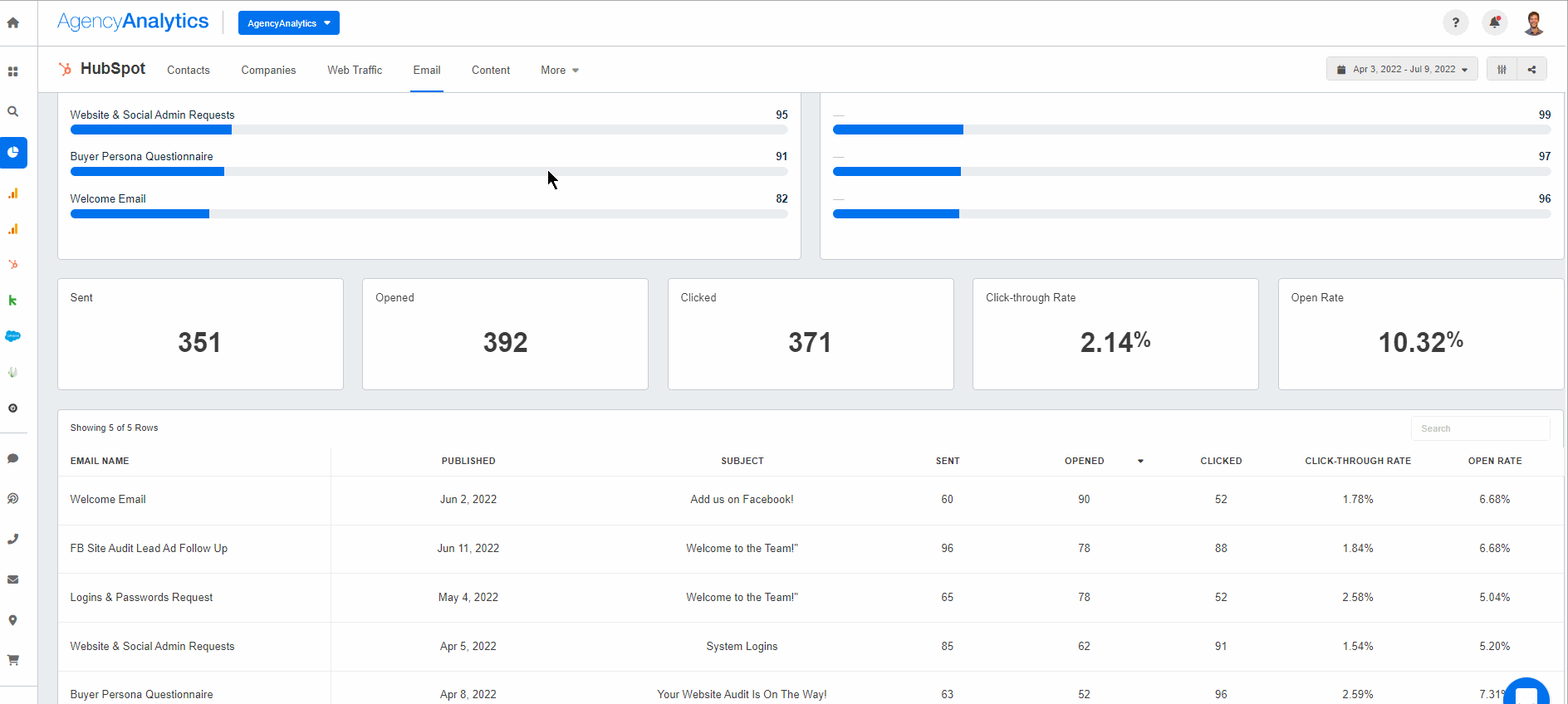
Use the AgencyAnalytics Hubspot dashboard to monitor and share your CRM, marketing, and Hubspot analytics data alongside all your agency’s other channels.
10. Klaviyo
This ecommerce email marketing service is built for a range of businesses, from entrepreneurs to established brands. Klaviyo allows seamless integration to top ecommerce platforms and offers advanced customer segmentation based on behavioral actions (such as viewing a specific product or shopping cart abandonment).
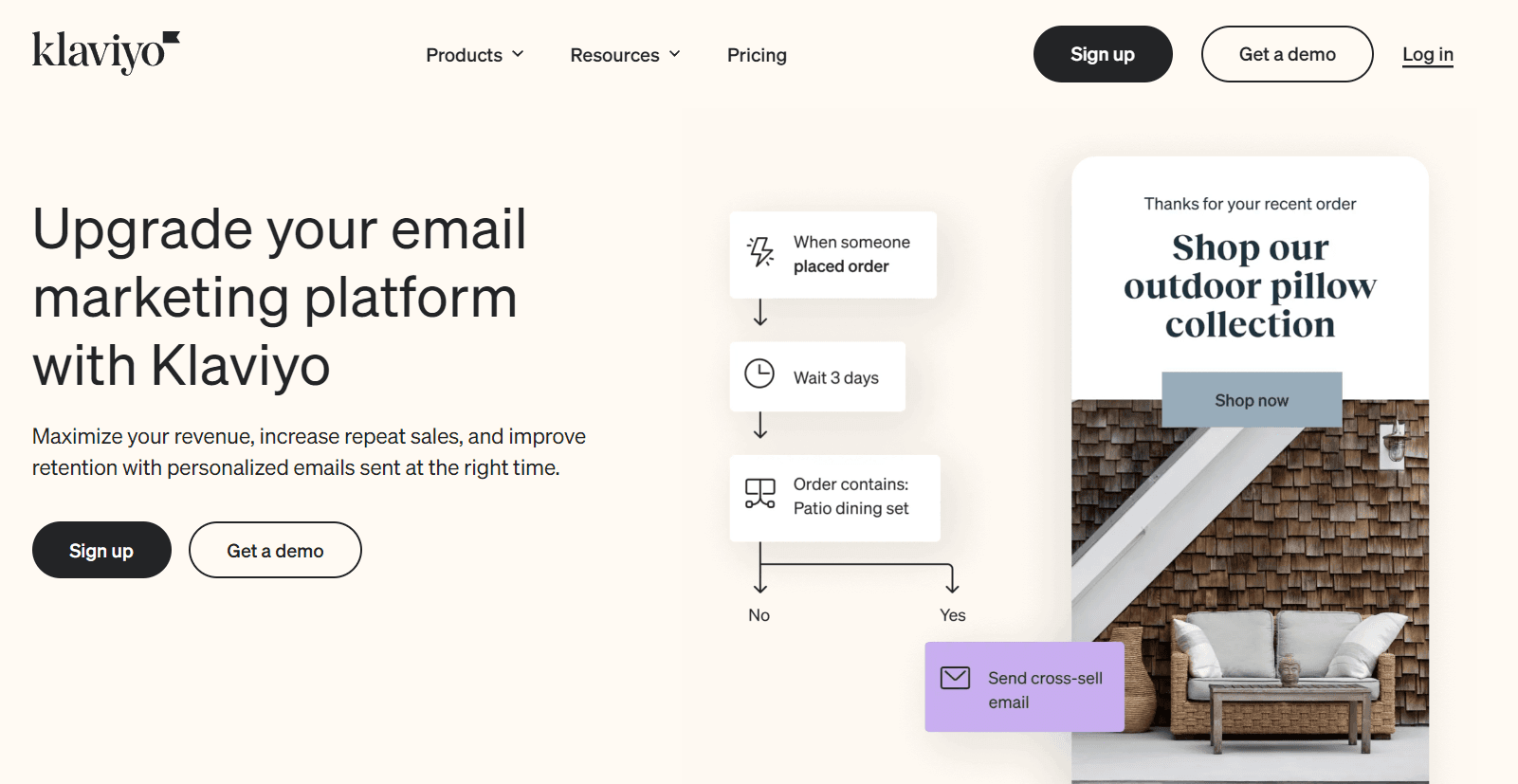
Best for: Agencies that manage ecommerce clients with significant inventory and need remarketing campaigns. Because Klaviyo is built specifically for ecommerce, it’s a highly specialized email marketing tool that benefits those trying to grow an online store and manage multiple customer transactions.
Features to note: Behavior-based email automation (such as cross-selling relevant products, shipping confirmation, and “back in stock” updates), pre-built templates (including discount emails and product recommendations), 220+ integrations, customer profile building, benchmarking data, and ecommerce reporting.
Pricing: Klaviyo’s Free plan includes up to 250 active profiles, 500 email sends per month, 150 SMS credits, and email support for the first 60 days. The Email-only plan starts at $20/month for 251–500 profiles (includes 5,000 monthly emails). The Email + SMS plan starts at $35/month for the same profile range (adds 1,250 SMS credits). Pricing scales based on active profiles, with email send limits capped at 10x your profile count, and features auto-upgrades and downgrades to match usage.
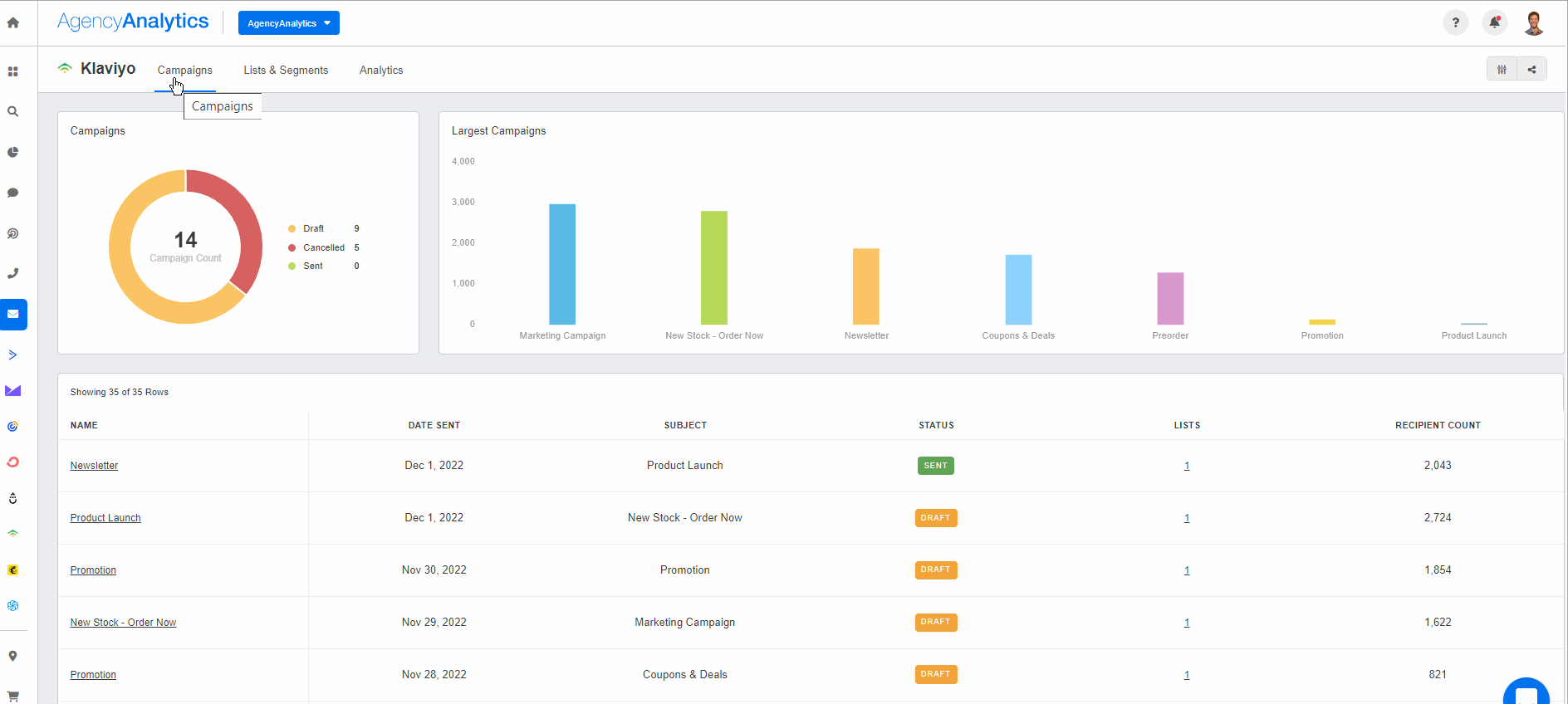
Keep on top of eCommerce email marketing progress. Try the AgencyAnalytics Klaviyo reporting dashboard today!
11. Salesforce
This is another powerhouse platform that also doubles as an email marketing software for agencies. Salesforce offers a full suite of features (such as a CRM, comprehensive email marketing, and ecommerce management) to house all sales and marketing efforts in one place.
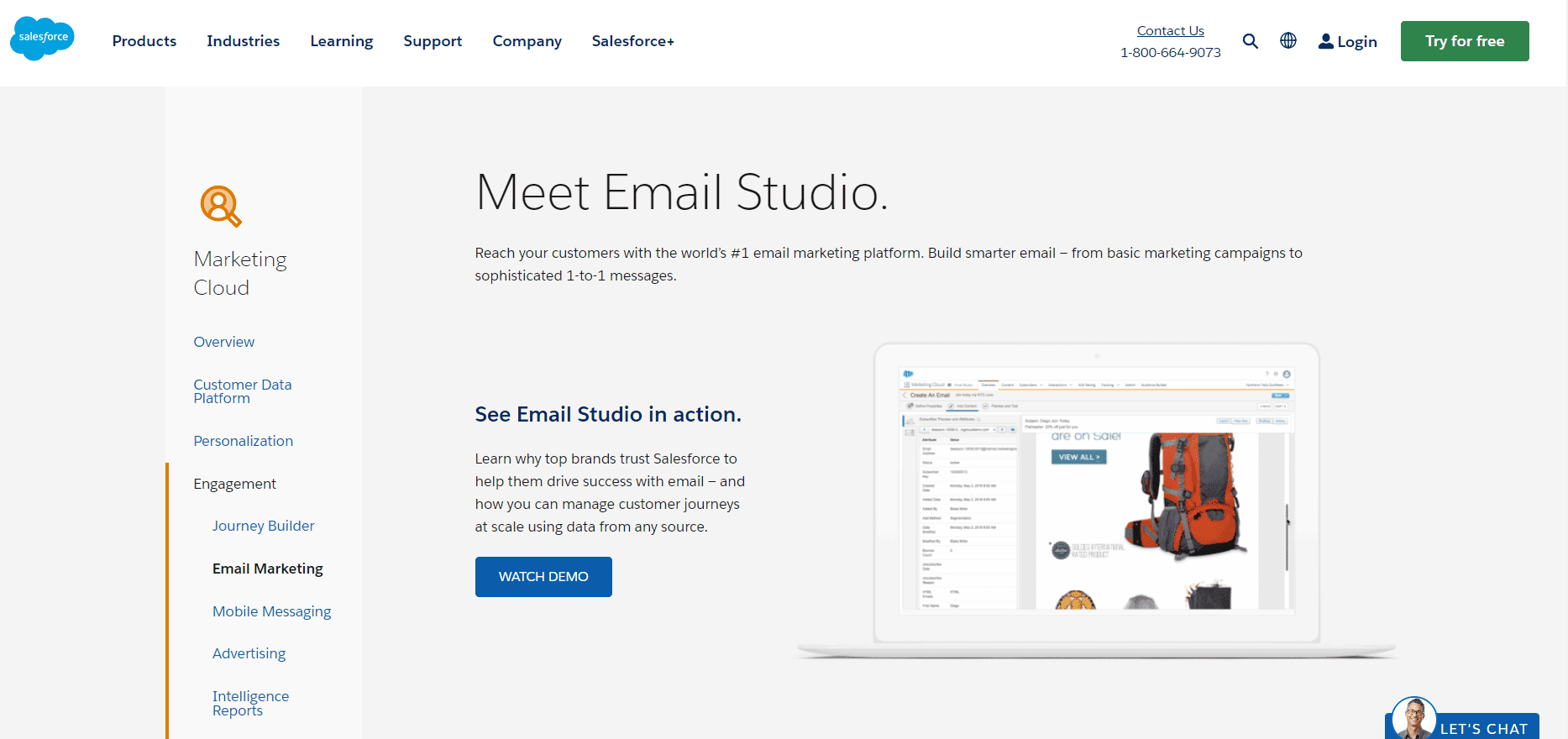
Best for: Agencies that manage large customer bases and need a comprehensive database that consolidates sales and marketing performance seamlessly.
Features to note: Integrated CRM and marketing platform, Email Studio, Journey Builder, Salesforce Commerce Cloud, dynamic content creation, advanced segmentation, AI-powered personalization, advanced tools for enterprise campaigns, detailed reporting, and cross-channel automation.
Pricing: Salesforce Marketing Cloud starts at approximately $400/month for basic email campaign tools. The next tiers—Pro and Corporate—cost around $1,250/month and $3,750/month, respectively. For enterprise-level automation and AI capabilities, Growth and Advanced bundles can reach $1,500–$3,250/month, with customized Enterprise packages available on request.
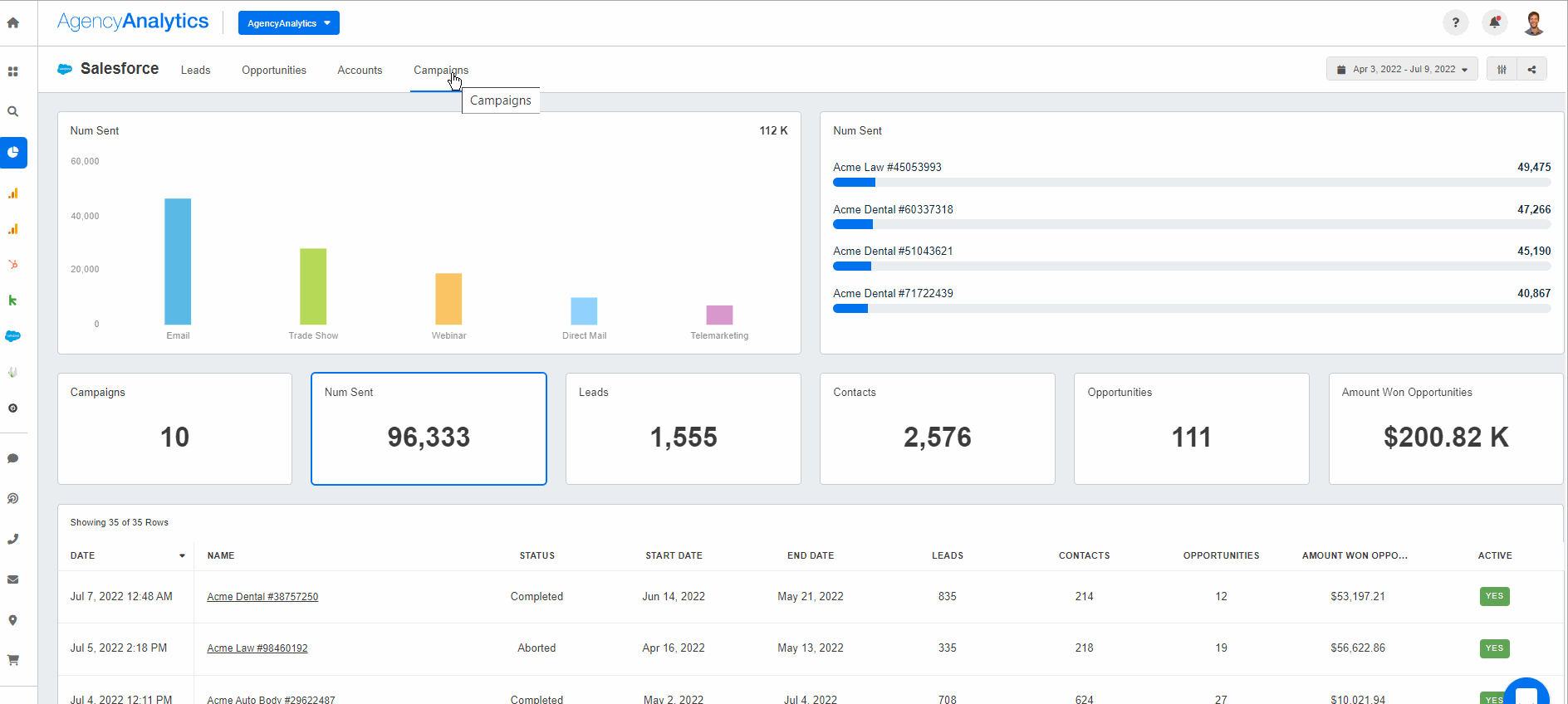
Keep tabs on email marketing performance and all other channels through the AgencyAnalytics Salesforce dashboard!
12. SharpSpring
SharpSpring, now part of Constant Contact, is a revenue growth platform that combines CRM, email marketing, and automation features to help agencies streamline client acquisition and retention.
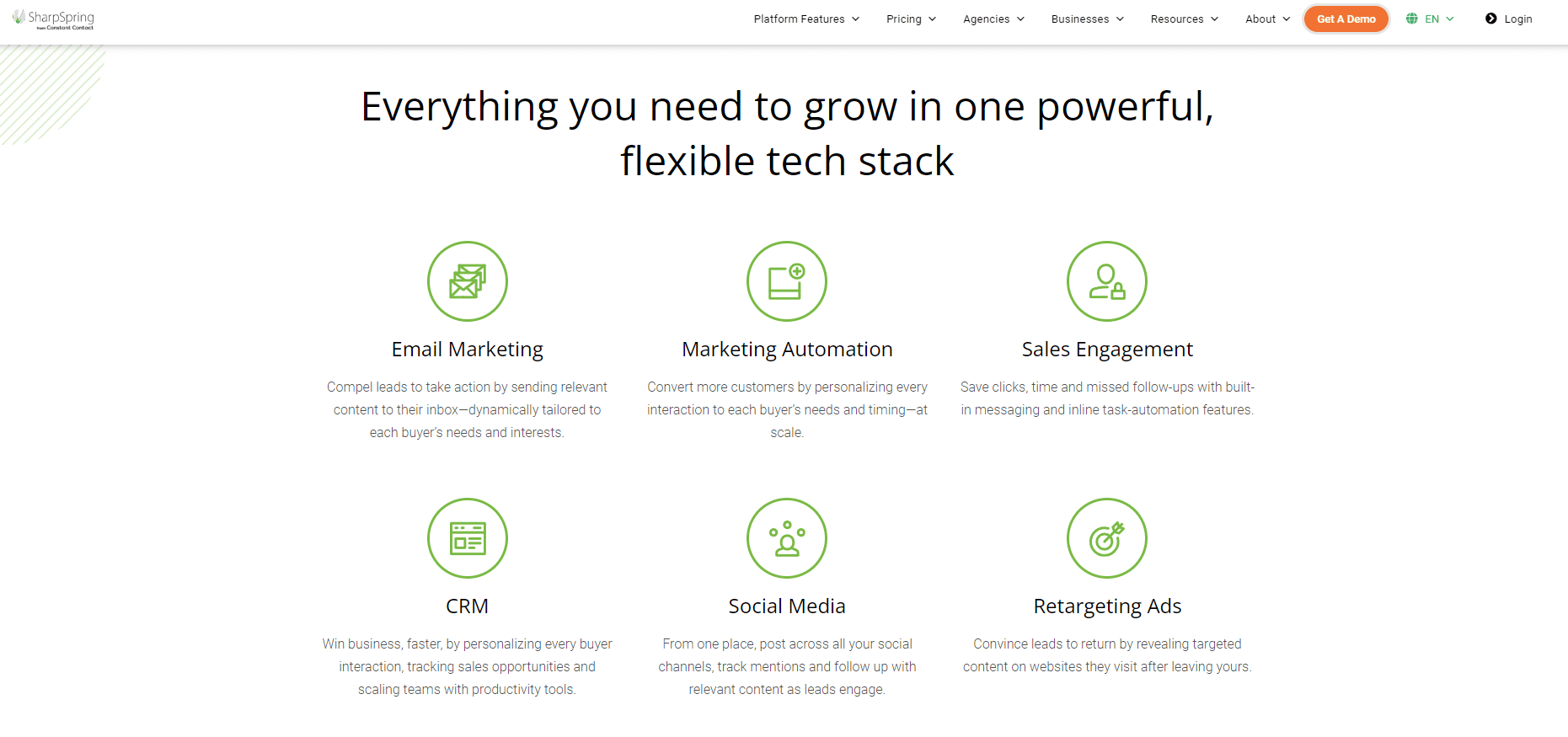
Best for: Agencies that want an all-in-one solution for CRM, sales automation, and behavior-based email campaigns—especially those managing small businesses with plans to scale.
Features to note: Built-in CRM and sales automation, dynamic email personalization, behavior-based automations, template library with drag-and-drop editor, landing page builder, ad retargeting, chatbots, and detailed analytics.
Pricing: SharpSpring starts from $449/month for 1,000 contacts, an unlimited number of users, and a full range of features. For 20,000 contacts, expect a $1,449/month fee. Agency and Enterprise rates are available upon request.
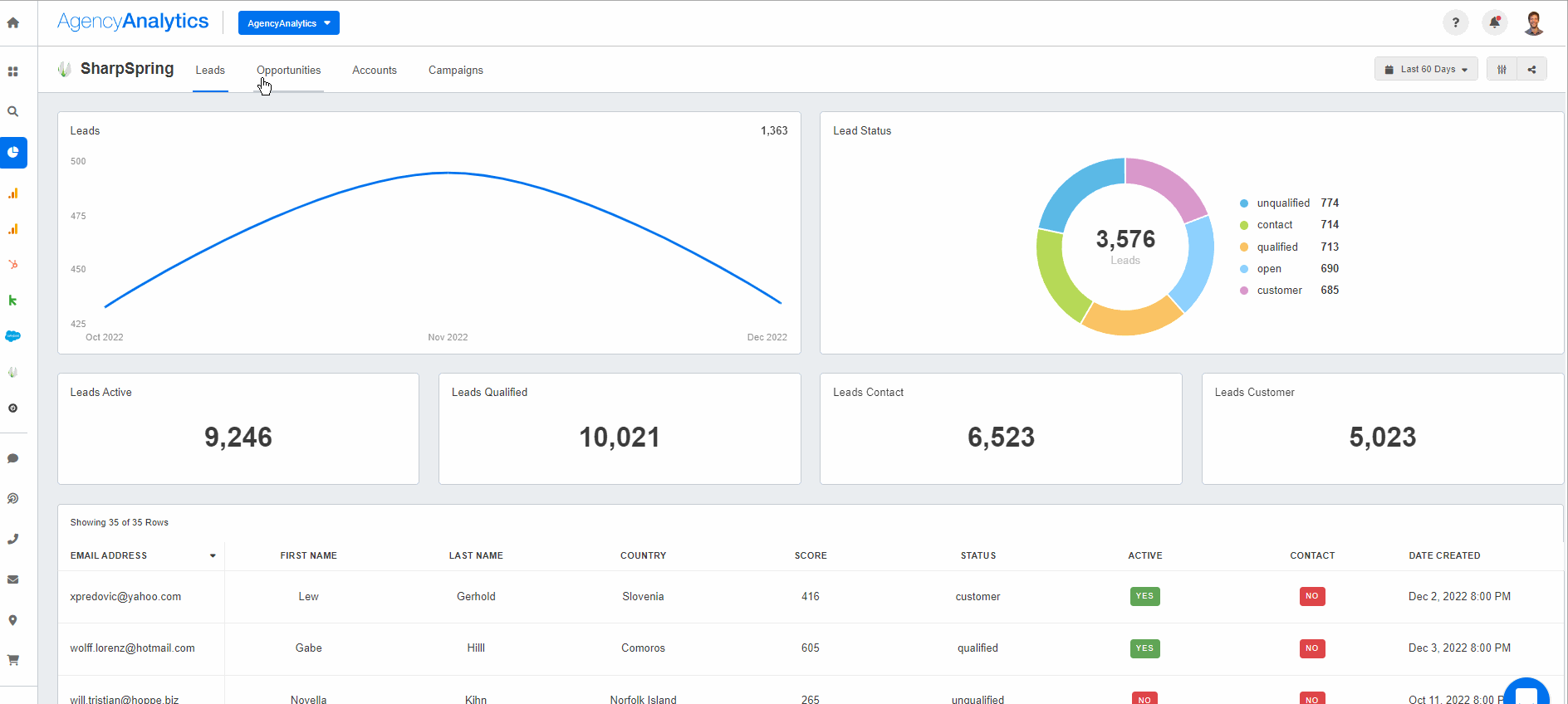
Use the AgencyAnalytics SharpSpring integration to understand the big picture and make email marketing recommendations.
Honorable mentions: Omnisend, MailerLite, and Mailjet
As an added bonus, we’ve included three honorable mentions if you’re still not sold on any of the options above or want to explore other email marketing services. Below are three straight-to-the-point email marketing services that’ll help you get the job done.
Keep in mind that these platforms don’t have seamless integrations with AgencyAnalytics (yet) if that’s on the top of your priority list when choosing the best option.
Omnisend
Omnisend is another email marketing software for agencies that focuses on growing ecommerce businesses. Create well-designed templates with Omnisend’s editor feature and segment email lists easily. That way, you’ll get the most from this email marketing platform.
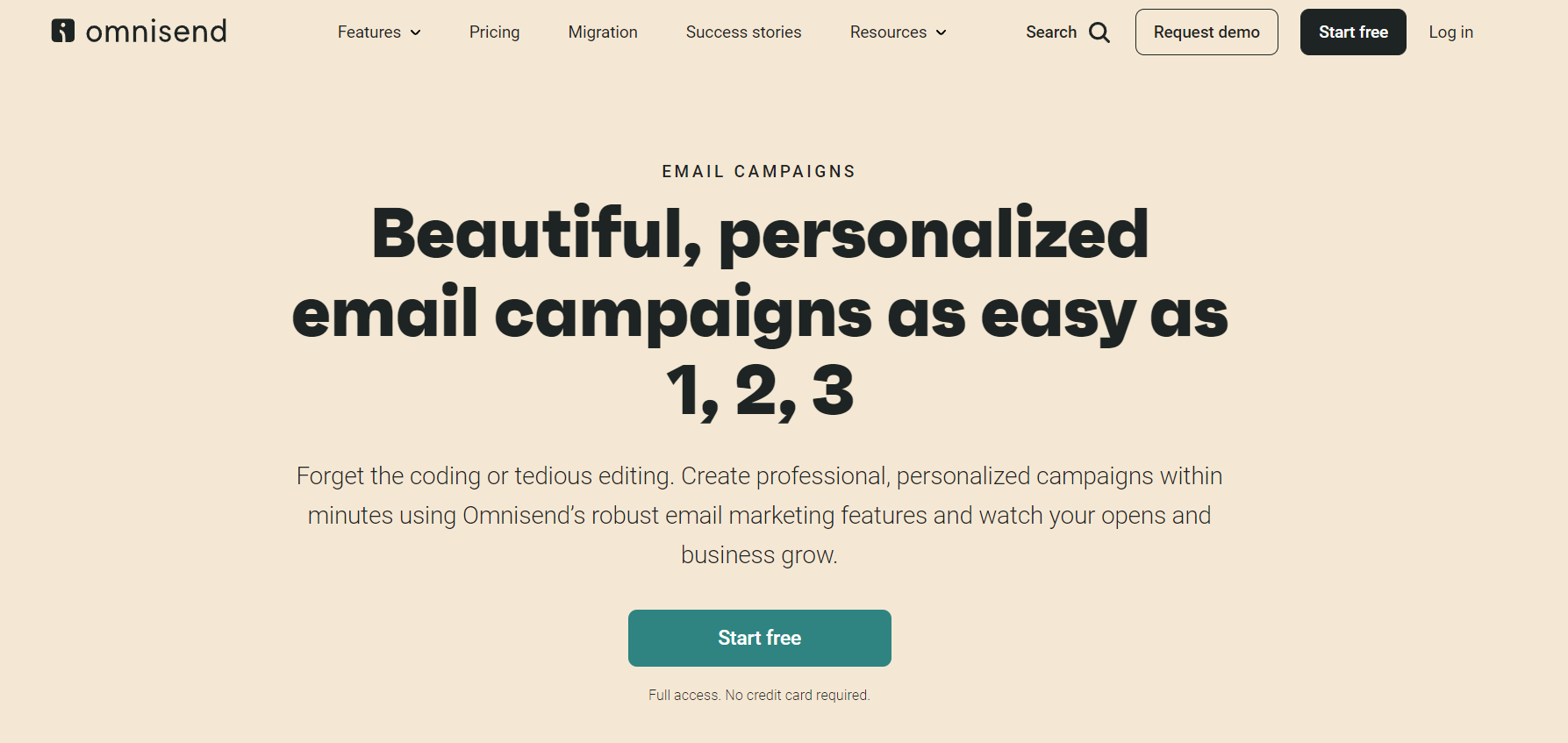
Best for: Agencies that want an intuitive, user-friendly email marketing service built specifically for ecommerce clients.
Features to note: Integrated email and SMS campaigns, customizable and pre-built templates (including product pickers and unique discount codes), a Campaign Booster (which re-sends unopened emails with different subject lines), pop-up forms, and pre-built workflows.
Pricing: Omnisend’s free plan includes up to 250 contacts and 500 emails/month. Paid plans start at $16/month for 500 contacts with unlimited emails, and the Pro plan begins at $59/month, adding advanced reporting and priority support.
MailerLite
MailerLite is a simple and easy-to-use email marketing service that works well for entrepreneurs and small businesses. Its intuitive interface removes the fluff and makes newsletter creation a breeze (which comes in handy when you’re short on time or not specialized in design).
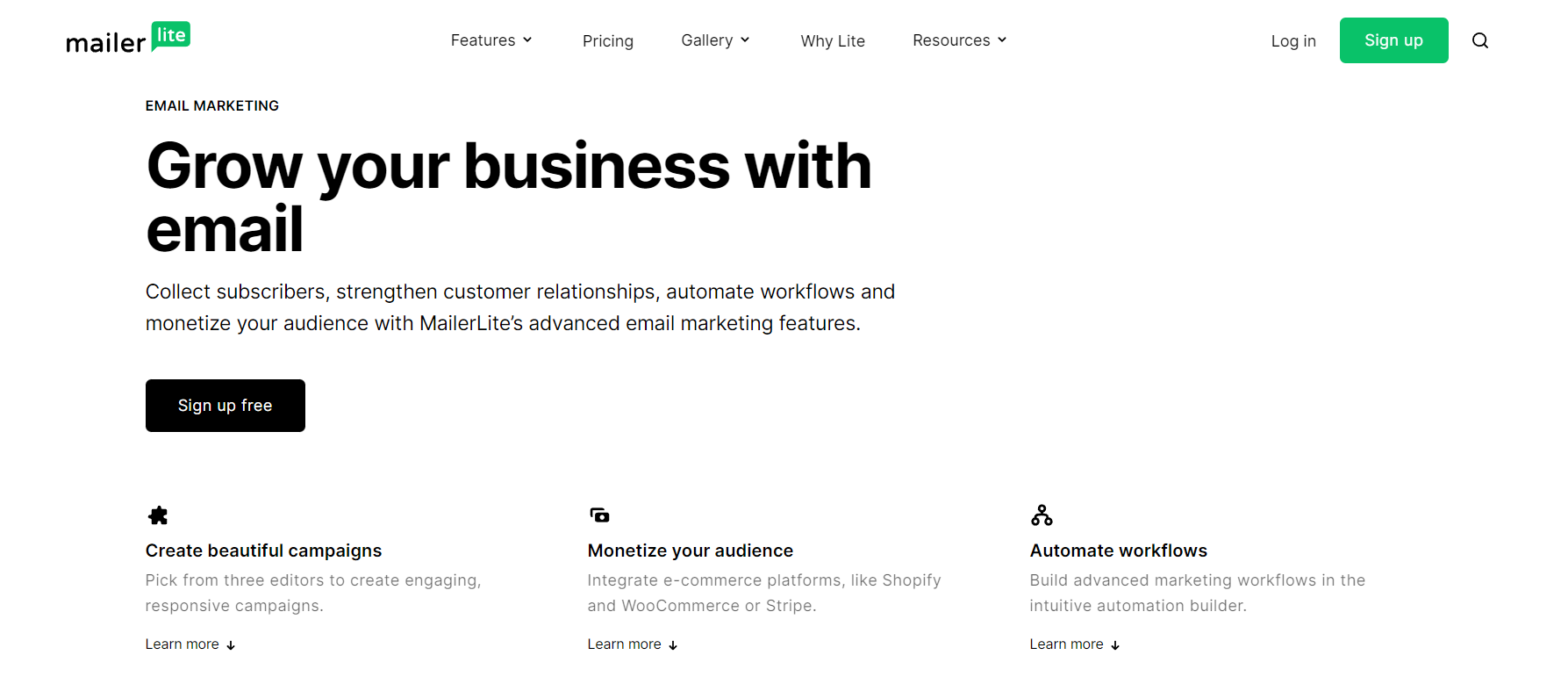
Best for: Agencies that want a straightforward email automation tool. MailerLite also works well if you manage clients with smaller businesses and don’t necessarily need a full suite of features (such as advanced marketing automation).
Features to note: Automated workflows, free image library, pre-made templates, email delivery by timezone, buildable surveys and quizzes, email verification, unsubscribe page builder, and a landing page builder.
Pricing: MailerLite’s free plan includes up to 1,000 subscribers and 12,000 monthly emails. The Growing Business plan starts at $10/month, while the Advanced plan starts at $21/month, offering unlimited emails, advanced automation, and additional analytics. Enterprise pricing is available on request.
Mailjet
If you’re looking for an email marketing service that involves no coding and collaboration, check out Mailjet. Create customizable, highly aesthetic, and responsive emails with no fuss or prior design experience required.
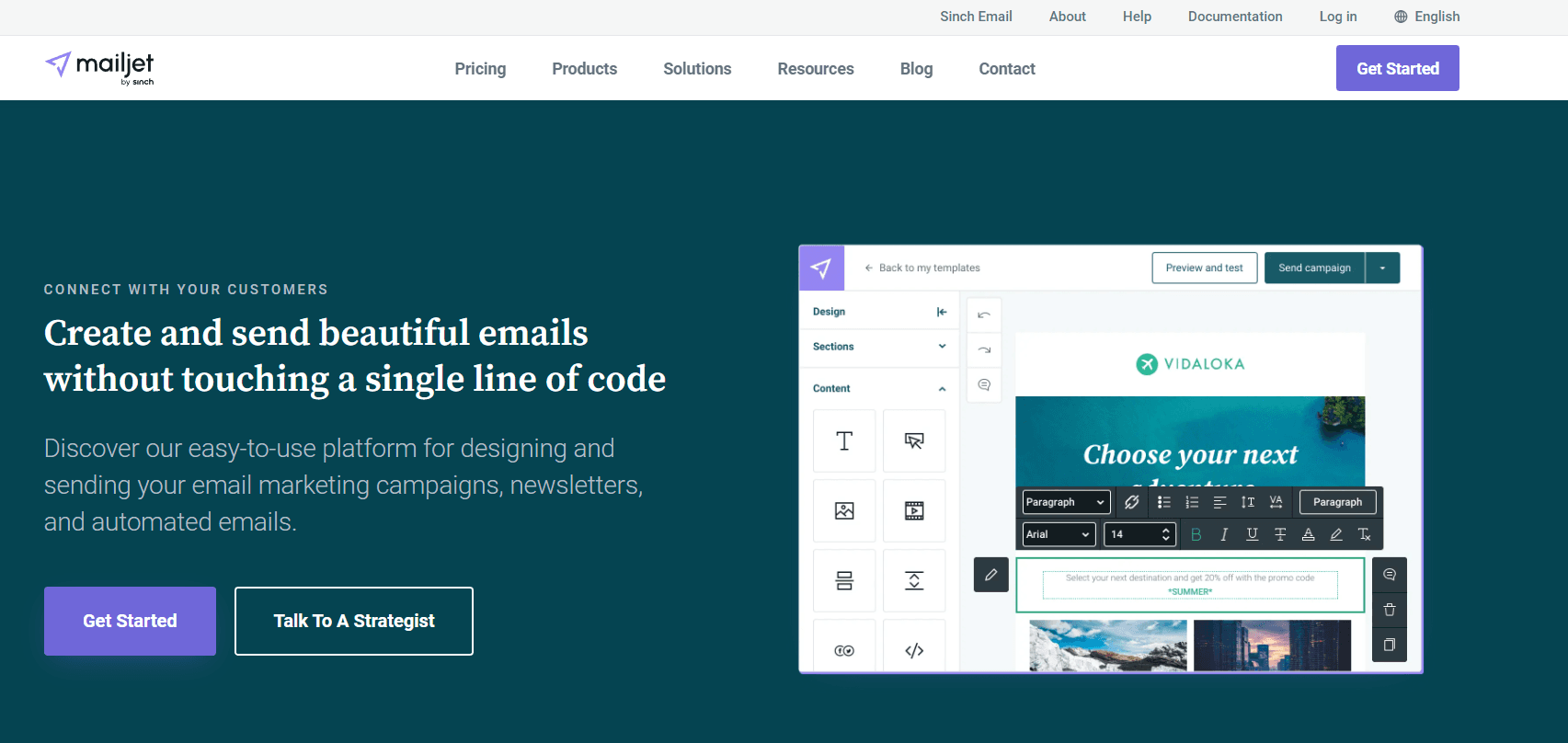
Best for: Agencies that want an intuitive email marketing service that allows multiple-user collaboration (you also have the ability to leave comments, request changes, and set user permissions).
Features to note: Drag-and-drop email editor, real-time user collaboration, A/B testing, automated workflows for each customer journey phase, 70+ integrations, and real-time data tracking.
Pricing: Mailjet’s free plan includes 6,000 emails/month (200 per day) with unlimited contacts. The Essential plan starts at $15/month for 15,000 emails, while the Premium plan begins at $25/month with marketing automation, segmentation, and priority support. Custom high-volume pricing is available.
Consolidate your client’s email marketing metrics in one place
And there you have it, a thorough review of some of the great email marketing software!
Choose an email marketing service that meets your agency’s demands and client requests, and select the best email marketing tool for your needs. That way, you’ll continue to create top-notch email newsletters and demonstrate your agency’s ROI month after month.
After you’ve worked hard to create beautiful email marketing campaigns for your clients, now what? It’s time to track those email KPIs and give critical insights into what went well or needs improvement.
Don’t waste time pulling all that data from email marketing tools manually–invest in a client reporting tool like AgencyAnalytics! Create a fully customizable email marketing template that’s easy to follow, captures all necessary insights, and helps your clients to understand what’s really happening.
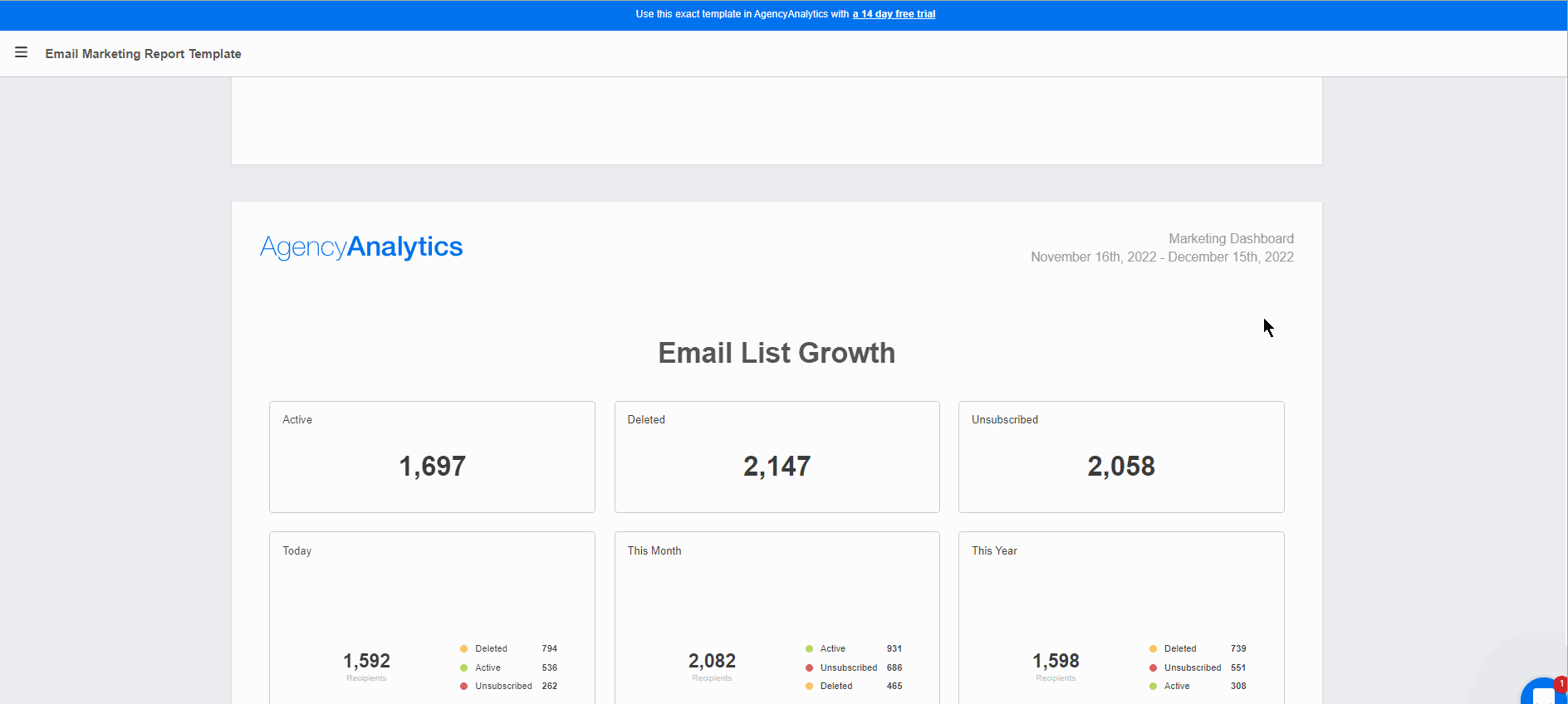
Ready to give it a try? Tracking your clients’ email marketing metrics has never been easier. Try AgencyAnalytics risk-free for 14 days–no credit card required.
Frequently asked questions about email marketing software for agencies
Clear guidance to help your agency choose smarter tools, streamline reporting, and deliver stronger client results.
Email marketing software for agencies must support multiple client accounts, streamline workflows, and offer clear visibility into campaign performance. Unlike tools built for single businesses, agency-friendly platforms prioritize multi-user access, client-specific permissions, and advanced automation that scales across accounts.
Strong segmentation, customizable templates, and integrations with other marketing platforms are essential to support diverse client needs. The best email marketing software for agencies also includes robust analytics, allowing you to measure performance, attribute revenue, and optimize client campaigns without jumping between dashboards.
Bonus points if the tool integrates seamlessly with AgencyAnalytics for centralized reporting.
Choosing the right email marketing software depends on each client’s goals, list size, ecommerce needs, and level of automation required. Ecommerce brands often benefit from platforms like Klaviyo or Drip with advanced segmentation and behavioral triggers. Service-based clients may prefer platforms with an all-in-one CRM, such as HubSpot or Keap.
Agencies managing multiple clients should also evaluate pricing models—some platforms charge by contacts, others by send volume—as well as the availability of automation workflows, A/B testing, and SMS marketing.
Ultimately, the right email marketing platform for agencies balances flexibility, scalability, and ease of use, making it easier to manage campaigns across many client accounts.
Key features for marketing agencies include drag-and-drop email builders, customizable templates, advanced automation workflows, and powerful audience segmentation. Tools with multi-user access, detailed analytics, and the ability to manage multiple platforms or client accounts in one interface are particularly useful.
Ecommerce agencies may require dynamic product feeds, transactional emails, or integrations with top ecommerce platforms like Shopify or WooCommerce. Other valuable capabilities include SMS campaigns, AI writing assistants, predictive analytics, landing page builders, and behavior-based triggers.
Above all, agencies should look for platforms that simplify client campaigns and reduce friction across teams—especially when managing large amounts of customer data.
Often, yes. Most email marketing platforms excel in specific areas—ecommerce automation, CRM management, enterprise-level customization—so agencies serving diverse industries rarely rely on a single system.
For example, ecommerce clients may need advanced segmentation and product-based automations, while B2B clients may need CRM integrations and sales tracking. Using multiple client accounts across different tools allows agencies to tailor services without forcing every client into the same system.
The key is ensuring each platform integrates smoothly into your reporting workflows, especially if you use AgencyAnalytics to consolidate metrics from many email providers into a single reporting environment.
The best email marketing software for agencies centralizes assets, automations, and analytics across multiple clients, reducing manual work and improving consistency. Multi-account management allows teams to toggle between client profiles, assign permissions, and organize campaigns without mixing data.
Advanced features like reusable templates, automation cloning, and visual workflow builders streamline recurring tasks. Reporting becomes easier too—especially when integrated with AgencyAnalytics—allowing agencies to monitor email marketing performance across all accounts in one place.
This reduces the learning curve, accelerates onboarding, and ensures every client benefits from the agency’s refined processes and shared best practices.
AgencyAnalytics connects directly to the most popular email marketing platforms, including Constant Contact, Drip, GoHighLevel, HubSpot, Mailchimp, and more. This makes it easy for agencies to pull all email KPIs into a single dashboard—no spreadsheets or manual exports. It simplifies email marketing performance tracking by automatically importing metrics like opens, click-through rates, automation performance, revenue attribution, and subscriber growth.
Agencies can build white-labeled client reports, schedule automated delivery, and combine email insights with data from SEO, paid search, social media, ecommerce, and CRM platforms. Compared to exporting CSVs or stitching together multiple tools, AgencyAnalytics eliminates reporting bottlenecks and gives clients clear, visual updates they actually understand.
Basic automation typically includes simple sequences like welcome emails, abandoned cart reminders, or time-based drip campaigns.
Advanced automation tools offer deeper personalization through behavior-based triggers, predictive analytics, dynamic content, and multichannel flows across email and SMS.
Platforms like ActiveCampaign, Klaviyo, and Drip provide visual workflow editors, conditional logic, and advanced segmentation that adapts to user behavior in real time.
For agencies managing complex funnel strategies, advanced automation unlocks far more precise targeting and higher conversion rates—especially when combined with website tracking, ecommerce data, and CRM insights.
Agencies supporting ecommerce customers typically need advanced automation, deep ecommerce integrations, and revenue-focused reporting. Tools like Klaviyo, Drip, and Shopify Email excel because they offer dynamic product feeds, cart abandonment flows, predictive analytics, and customer segmentation based on browsing or purchase behavior.
These platforms integrate directly with top ecommerce platforms and support transactional emails, cross-sell recommendations, welcome flows, and SMS automation.
For agencies managing multiple ecommerce brands, choosing an email marketing platform with strong analytics and multi-account support ensures consistent campaign performance and seamless reporting inside AgencyAnalytics.
Great email marketing software helps agencies deliver more targeted campaigns, nurture leads, and monitor audience behavior—resulting in better outcomes for clients. Strong reporting and automation tools make it easy to demonstrate ROI, which improves retention and positions your agency as a strategic partner.
For client acquisition, offering email campaign management or advanced automation as a standalone service can differentiate your agency from competitors. As your agency scales, choosing platforms with enterprise-level features, reliable deliverability, and flexible pricing ensures you can support clients of all sizes while maintaining operational efficiency.
An email marketing performance report gives clients a clear view of how your marketing efforts influence engagement, conversions, and revenue. It typically highlights opens, click-through rates, automation performance, and activity from welcome emails, promotions, and behavioral sequences. Strong reports also show how email supports other channels—whether that’s affiliate marketers, ecommerce flows, or cross-channel SMS automation.
For agencies, choosing reporting platforms with an intuitive interface, clear data visualizations, and a minimal learning curve makes reporting far easier—especially when managing multiple clients. Using tools like AgencyAnalytics, agencies visualize performance alongside website data, sales automation, and broader funnel insights. The result is a report that strengthens client understanding and drives better decisions across every campaign.

Written by
Faryal Khan is a multidisciplinary creative with 10+ years of experience in marketing and communications. Drawing on her background in statistics and psychology, she fuses storytelling with data to craft narratives that both inform and inspire.
Read more posts by Faryal KhanSee how 7,000+ marketing agencies help clients win
Free 14-day trial. No credit card required.



